Air Conditioning
Choosing the Perfect Air Conditioning Heat Pump: Your Ultimate Guide

Fed up with overheating in the summer and freezing during the winter? Search no more, as we present to you the definitive guide on selecting the ideal air conditioning heat pump!
In this article, we’ll break down the basics, factors to consider, sizing, energy efficiency, types, noise levels, installation, maintenance, and even how to find the best deal.
Let’s dive in and find the ideal air conditioning heat pump that will keep you comfortable all year round!
Key Takeaways
- Air conditioning heat pumps provide both cooling and heating and are energy-efficient and environmentally friendly.
- Factors such as outdoor temperature, space size, insulation, and proper sizing, installation, and maintenance are crucial when choosing a heat pump.
- Noise level and energy efficiency ratings should be considered, and professional consultation is recommended.
- Types of heat pumps include air source, ground source, and ductless heat pumps, and comparing prices, prioritizing features, researching brands, finding reputable dealers, and considering long-term costs are important factors to consider.
Understanding the Basics of Air Conditioning Heat Pumps
We’ll start by explaining the key components of air conditioning heat pumps. Air conditioning heat pumps are highly efficient systems that provide both cooling and heating for homes and buildings. They consist of four main components: the compressor, the condenser, the expansion valve, and the evaporator. These components work together to transfer heat from one area to another, depending on the desired temperature.

Factors affecting the performance of air conditioning heat pumps include the outdoor temperature, the size of the space being cooled or heated, and the insulation of the building.
Additionally, the benefits of heat pump technology are numerous. They’re energy-efficient, saving homeowners and businesses money on their utility bills. Heat pumps also provide consistent and comfortable indoor temperatures all year round. They’re environmentally friendly, as they use less electricity and produce fewer greenhouse gas emissions compared to traditional heating and cooling systems.
Factors to Consider When Choosing an Air Conditioning Heat Pump
When considering an air conditioning heat pump, there are several factors to keep in mind. Here are three important considerations to help you make the right choice:
-
Sizing considerations: It’s crucial to select a heat pump that’s properly sized for your space. A unit that’s too small may struggle to cool or heat your home efficiently, while one that’s too big will consume excessive energy. Consider factors such as the size of your space, insulation levels, and climate conditions to determine the appropriate size.

-
Installation: Proper installation is key to ensuring optimal performance and longevity of your air conditioning heat pump. It’s recommended to hire a professional HVAC technician who can accurately install the unit, ensuring it’s positioned correctly and all connections are secure.
-
Maintenance: Regular maintenance is essential to keep your heat pump running smoothly. This includes tasks such as cleaning or replacing filters, inspecting coils, and checking refrigerant levels. Following the manufacturer’s guidelines and scheduling professional maintenance checks will help extend the lifespan of your heat pump.
Considering these factors will help you make an informed decision when choosing an air conditioning heat pump. Now, let’s delve into the next section and explore how to size your heat pump for optimal performance.
Sizing Your Air Conditioning Heat Pump for Optimal Performance
When sizing an air conditioning heat pump for optimal performance, there are several factors that need to be considered.
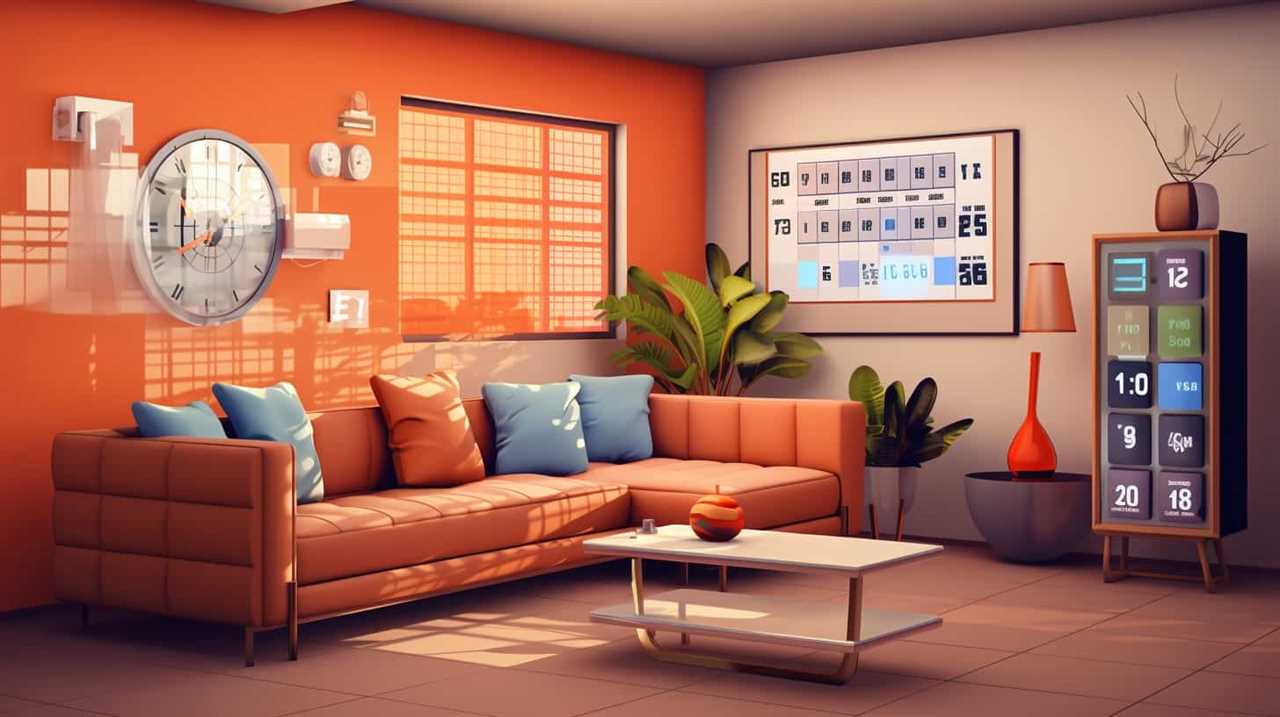
These factors include:
- The size of the space being cooled or heated
- The climate in which the pump will be used
- The insulation of the building
Calculating the optimal capacity of the pump requires taking into account these factors, as well as the desired temperature range and the number of occupants in the space.
Additionally, energy efficiency considerations should also be taken into account to ensure that the pump operates efficiently and minimizes energy consumption.
Factors Influencing Pump Size
To ensure optimal performance, it’s important to consider several factors when sizing your air conditioning heat pump. Here are three key considerations:
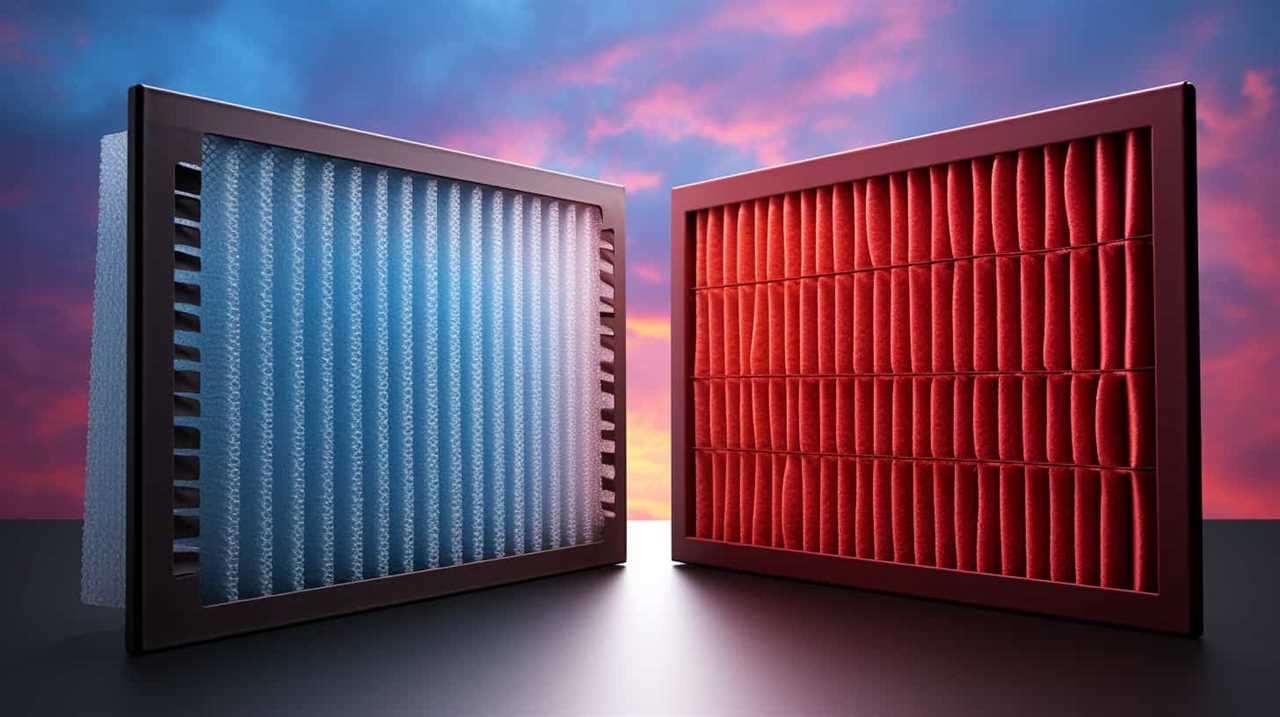
-
Factors affecting pump efficiency: The efficiency of your heat pump is influenced by various factors, such as the type and size of the compressor, the heat exchanger design, and the overall system layout. Choosing the right components and configurations can significantly impact the pump’s efficiency.
-
Impact of climate on pump size: The climate in which your heat pump will operate plays a crucial role in determining its size. In colder climates, the heat pump needs to work harder to provide sufficient heating, which may require a larger unit. Conversely, in warmer climates, a smaller unit may be sufficient to meet cooling demands.
-
Load calculation: Properly sizing your heat pump requires a thorough load calculation, taking into account factors like the size and layout of the space, insulation levels, and the number of occupants. This calculation ensures that the heat pump is adequately sized to meet the heating and cooling needs of your specific environment.
Considering these factors when sizing your air conditioning heat pump will help you achieve optimal performance and energy efficiency.
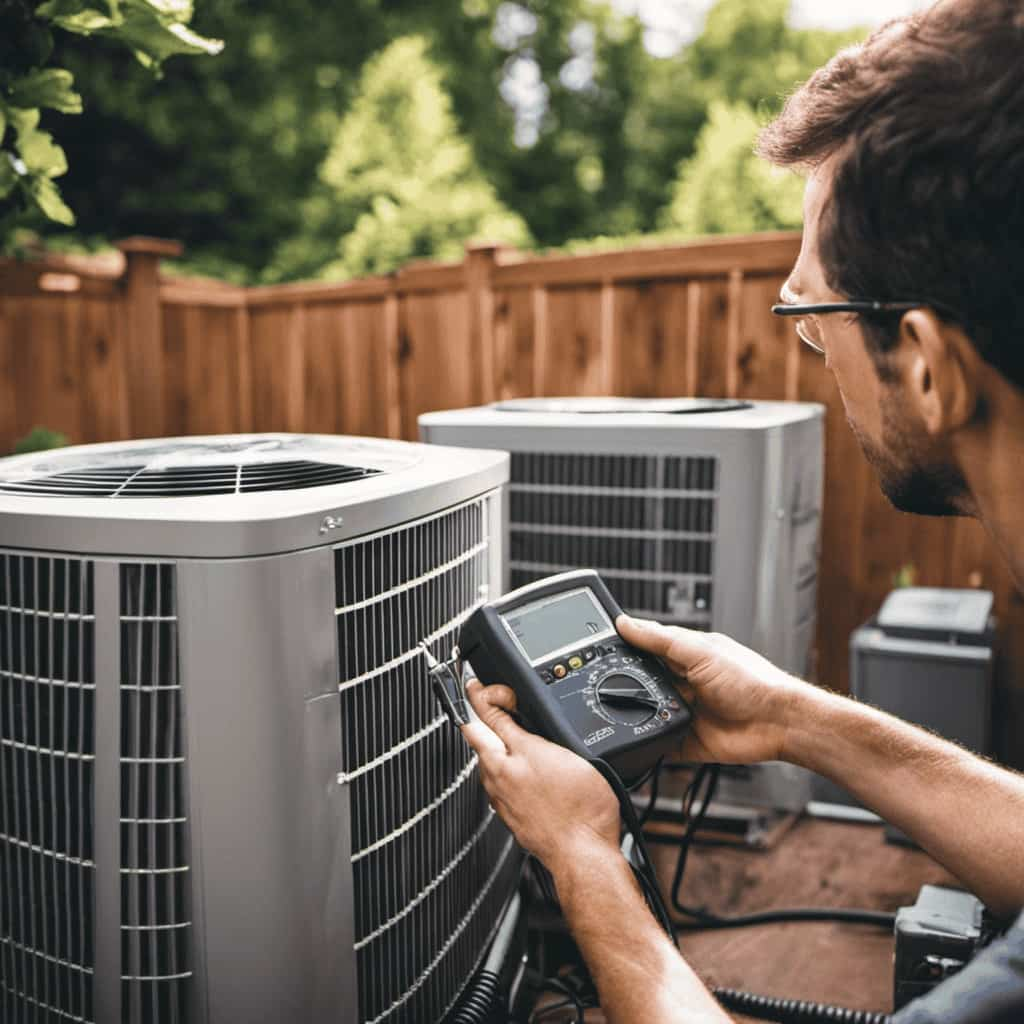
Calculating Optimal Capacity
For optimal performance, we need to calculate the optimal capacity when sizing our air conditioning heat pump.
Calculating the optimal capacity involves determining the right size of the heat pump to ensure efficient and effective cooling and heating. One key factor in this calculation is the efficiency of the heat pump.
By analyzing the energy consumption of different heat pump models, we can determine their efficiency levels and choose the one that provides the most efficient performance for our specific needs.
It’s important to consider both cooling and heating requirements when calculating the optimal capacity. This analysis ensures that the heat pump isn’t oversized or undersized, leading to energy wastage or inadequate heating and cooling.
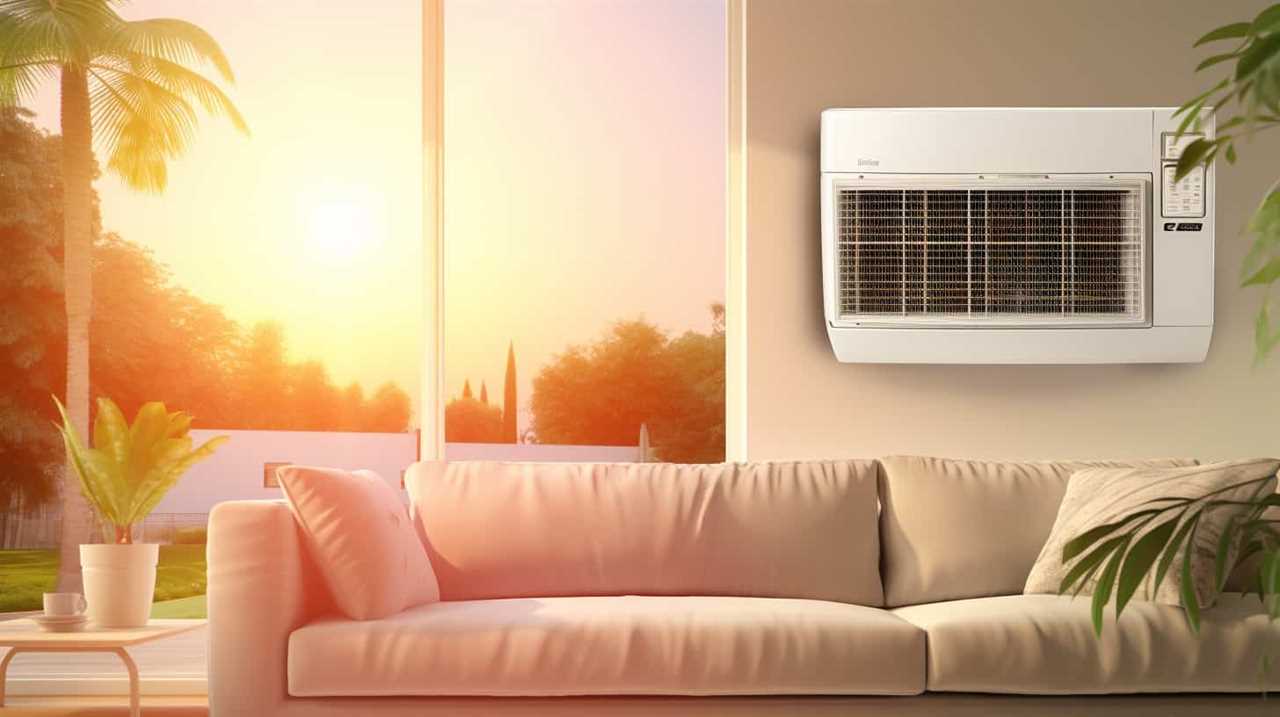
Energy Efficiency Considerations
As we consider energy efficiency, we must size our air conditioning heat pump for optimal performance. Choosing the right size is crucial in improving energy efficiency and ensuring that your system operates at its peak efficiency.
Here are three key considerations when it comes to sizing your air conditioning heat pump:
-
Room size: The square footage of the room or area you want to cool is an essential factor in determining the right size. A unit that’s too small may struggle to cool the space effectively, while an oversized unit may cycle on and off frequently, wasting energy.
-
Insulation: The level of insulation in your home affects how well it retains cool air. Proper insulation reduces energy loss and helps the air conditioning heat pump work more efficiently. Consider the insulation quality when sizing your unit.
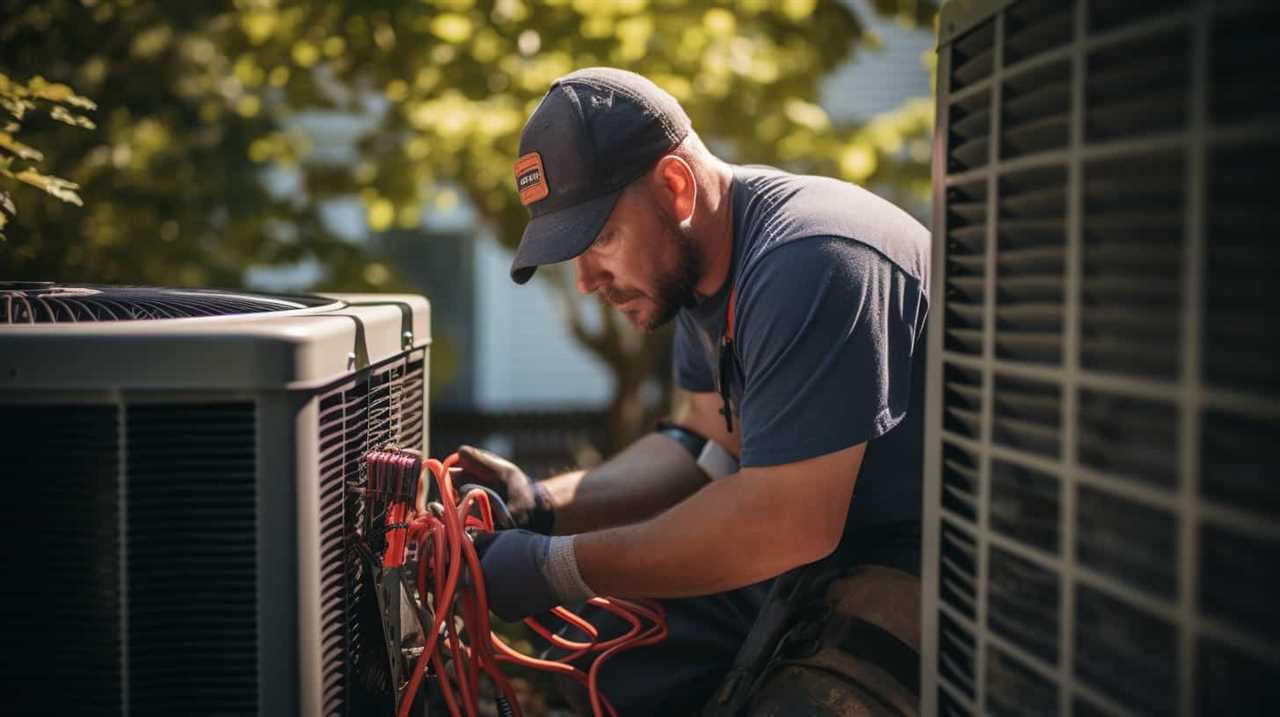
-
Climate: The climate in your area plays a significant role in determining the size of your air conditioning heat pump. Hotter climates may require a larger unit to provide adequate cooling, while milder climates may allow for a smaller unit.
Energy Efficiency: Finding a Heat Pump With High SEER and HSPF Ratings
When it comes to energy efficiency in air conditioning heat pumps, two key ratings to consider are SEER (Seasonal Energy Efficiency Ratio) and HSPF (Heating Seasonal Performance Factor).
The SEER rating measures the cooling efficiency of the heat pump, while the HSPF rating measures its heating efficiency.
High SEER and HSPF ratings are important because they indicate that the heat pump can provide efficient cooling and heating, resulting in lower energy consumption and cost savings for the homeowner.
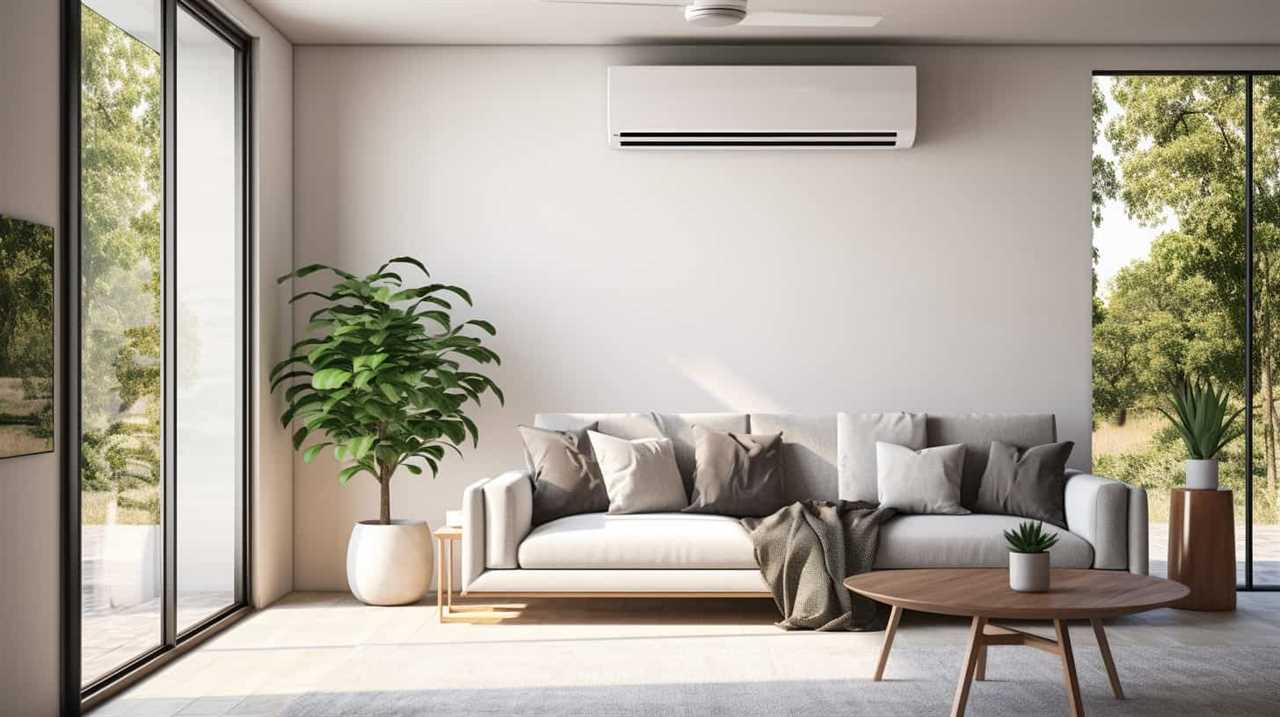
SEER Vs HSPF: Differences
We prioritize energy efficiency when selecting a heat pump, focusing on high SEER (Seasonal Energy Efficiency Ratio) and HSPF (Heating Seasonal Performance Factor) ratings. Understanding the differences between SEER and HSPF is crucial in finding the most efficient heat pump for your needs.
Here are three key points to consider:
-
SEER vs HSPF: Efficiency Comparison: SEER measures the cooling efficiency of a heat pump, while HSPF measures its heating efficiency. Both ratings are important indicators of energy efficiency, allowing you to compare different models and choose the one that best suits your climate and usage requirements.
-
SEER vs HSPF: Impact on Energy Consumption: A heat pump with a higher SEER rating will consume less energy during cooling, resulting in lower energy bills. Similarly, a heat pump with a higher HSPF rating will consume less energy during heating. By selecting a heat pump with high SEER and HSPF ratings, you can reduce your energy consumption and minimize your environmental impact.
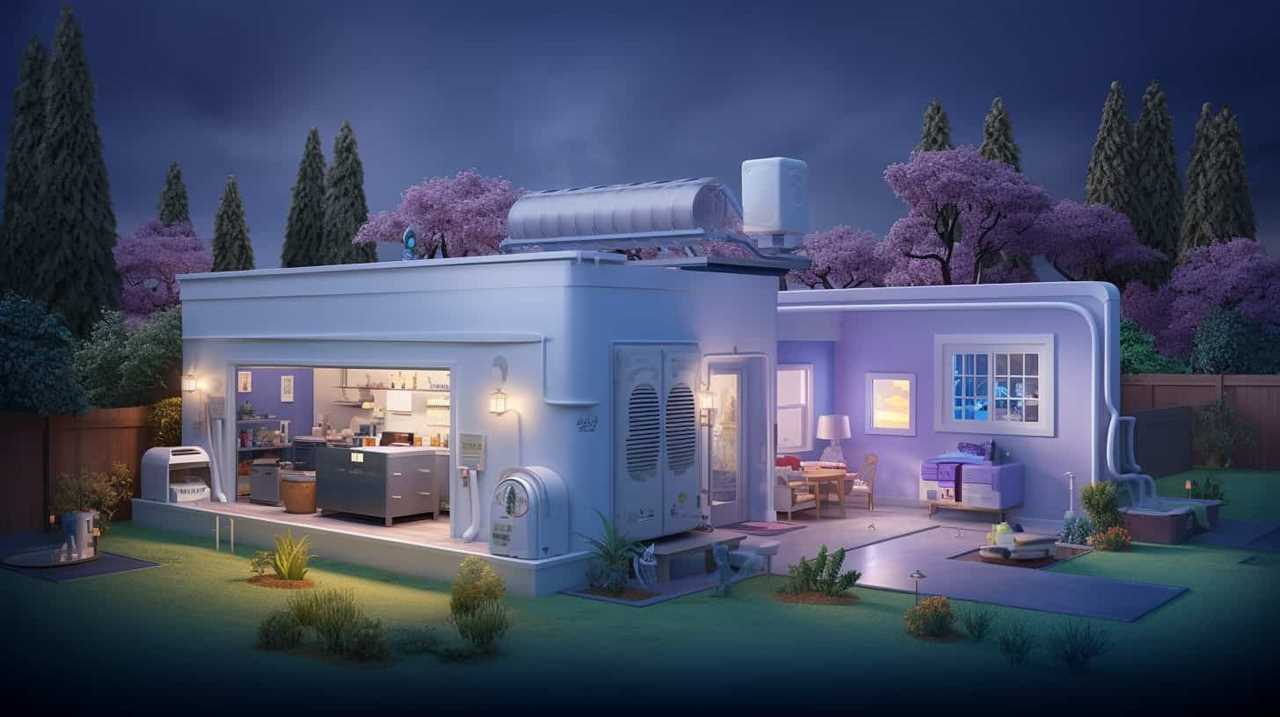
-
Finding the Right Balance: When choosing a heat pump, it’s important to strike a balance between SEER and HSPF ratings. Consider your climate and usage patterns to determine the optimal balance between cooling and heating efficiency. Consulting with a professional will help you find the perfect heat pump that meets your energy efficiency needs.
Importance of High Ratings
To maximize energy efficiency, we prioritize heat pumps with high SEER and HSPF ratings. Energy efficiency ratings have a significant impact on long-term cost savings.
When choosing a heat pump, it’s crucial to consider the SEER rating, which stands for Seasonal Energy Efficiency Ratio. The SEER rating measures the cooling efficiency of the heat pump. The higher the SEER rating, the more energy-efficient the heat pump is, leading to lower energy consumption and reduced utility bills. Choosing a heat pump with a higher SEER rating can result in substantial savings over time.
In addition to SEER, another important rating to consider is the HSPF rating, which stands for Heating Seasonal Performance Factor. The HSPF rating measures the heating efficiency of the heat pump. Similar to SEER, a higher HSPF rating indicates better energy efficiency and lower operating costs.

Exploring Different Types of Air Conditioning Heat Pumps
Let’s dive into the various types of air conditioning heat pumps available in the market.
Here are three types of heat pump technology you can consider:
-
Air Source Heat Pumps: These pumps extract heat from the outdoor air and transfer it indoors. They’re cost-effective and suitable for moderate climates. However, their efficiency may decrease in extremely cold temperatures.
-
Ground Source Heat Pumps: Also known as geothermal heat pumps, these systems use the stable temperature of the ground to heat or cool your home. They provide consistent performance, high energy efficiency, and long-term savings. However, their installation costs can be higher.
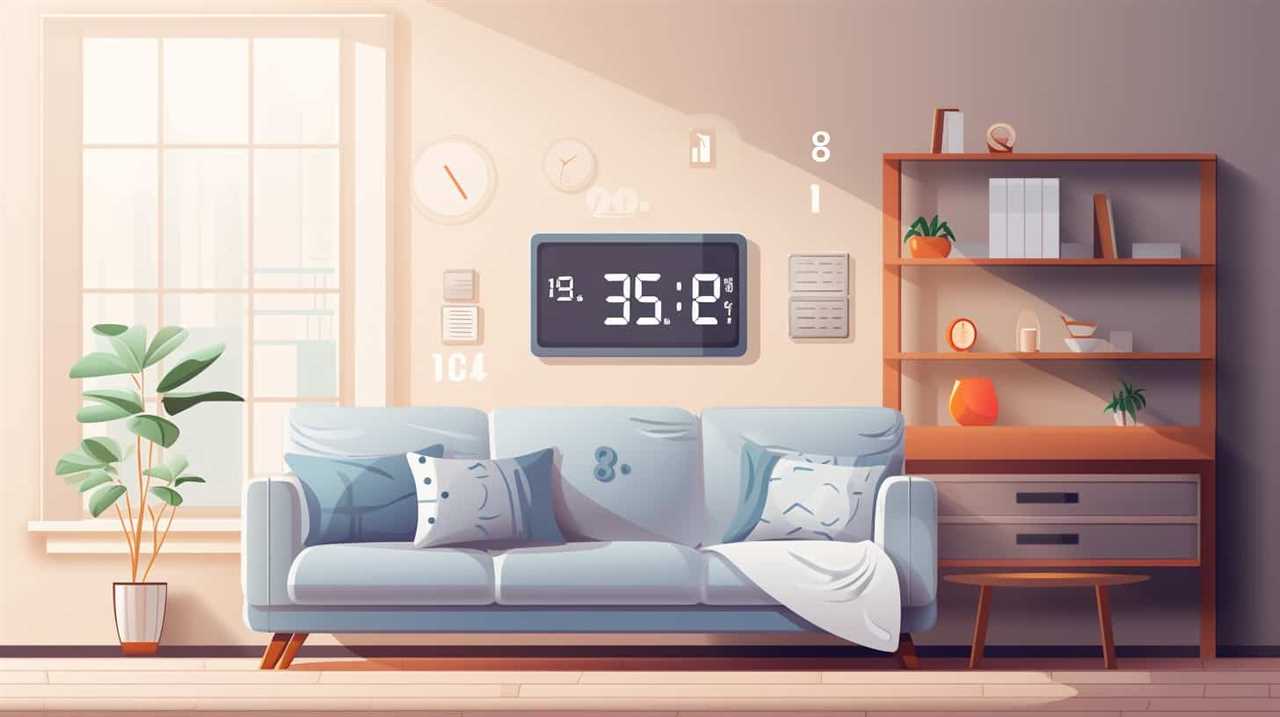
-
Ductless Heat Pumps: These compact and versatile systems are easy to install and provide zoned heating and cooling. They eliminate the need for ductwork and allow personalized comfort in different areas of your home. Ductless heat pumps are energy-efficient, quiet, and provide excellent indoor air quality.
Exploring these different types of air conditioning heat pumps will help you make an informed decision when selecting the perfect system for your home.
Assessing the Noise Levels of Air Conditioning Heat Pumps
Assessing the noise levels of air conditioning heat pumps can help us determine the most suitable option for our home. Evaluating performance and minimizing vibration are essential factors to consider when selecting an air conditioning heat pump. To assist you in making an informed decision, here is a table showcasing the noise levels of different heat pump models:
| Heat Pump Model | Noise Level (dB) | Performance Rating | Vibration Level |
|---|---|---|---|
| Model A | 50 | Excellent | Low |
| Model B | 60 | Good | Medium |
| Model C | 70 | Average | High |
| Model D | 80 | Poor | Very High |
As you can see, each model varies in terms of noise level, performance rating, and vibration level. It is crucial to find a balance between low noise levels, excellent performance, and minimized vibration. By evaluating these factors, you can select an air conditioning heat pump that ensures a comfortable and peaceful environment in your home.
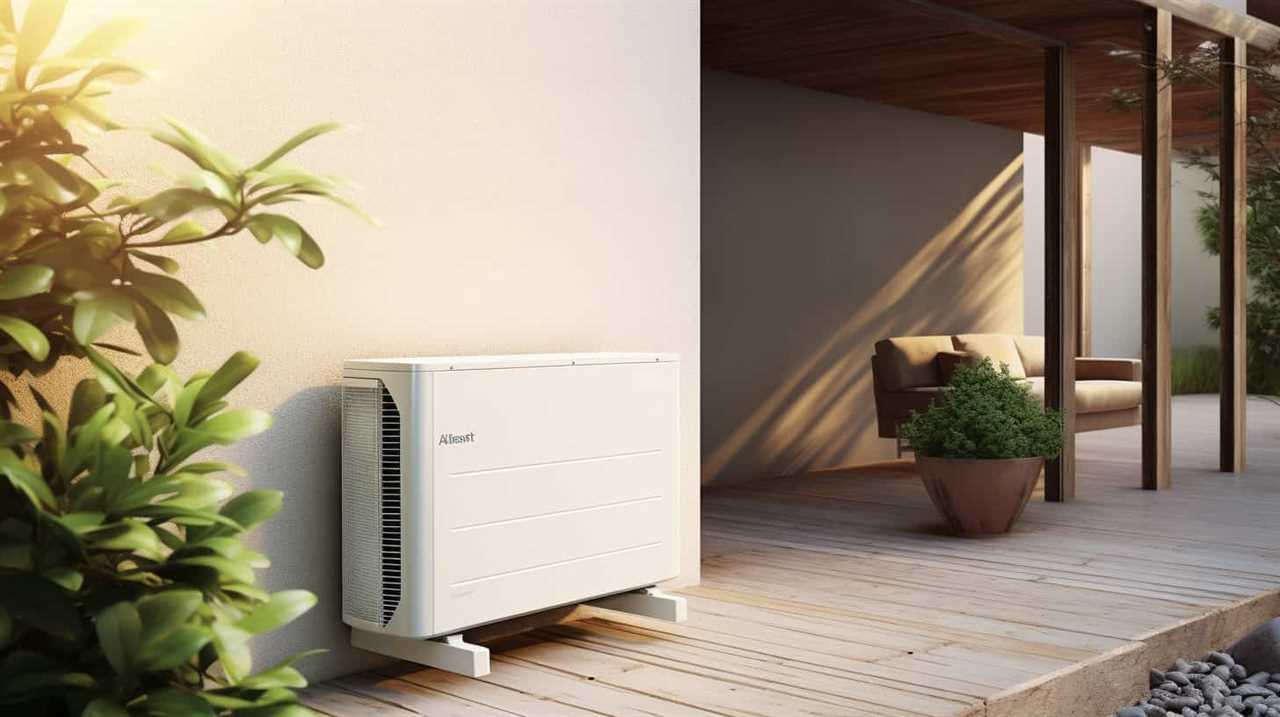
The Importance of Proper Installation and Maintenance for Heat Pumps
We must prioritize proper installation and maintenance to ensure the optimal performance and longevity of our heat pumps.
When it comes to heat pump installation, it’s crucial to hire a professional to ensure it’s done correctly. Common installation mistakes, such as improper sizing, incorrect refrigerant charge, or inadequate ductwork, can lead to reduced efficiency and frequent breakdowns.
Regular maintenance is equally important to keep the heat pump running smoothly. By scheduling regular inspections and tune-ups, you can identify and address any issues before they become major problems. Benefits of regular maintenance include improved energy efficiency, extended lifespan of the heat pump, and enhanced indoor air quality.
Comparing Prices and Getting the Best Deal on an Air Conditioning Heat Pump
When comparing prices and looking to get the best deal on an air conditioning heat pump, it’s important that we consider our budget and prioritize features that align with our specific needs.
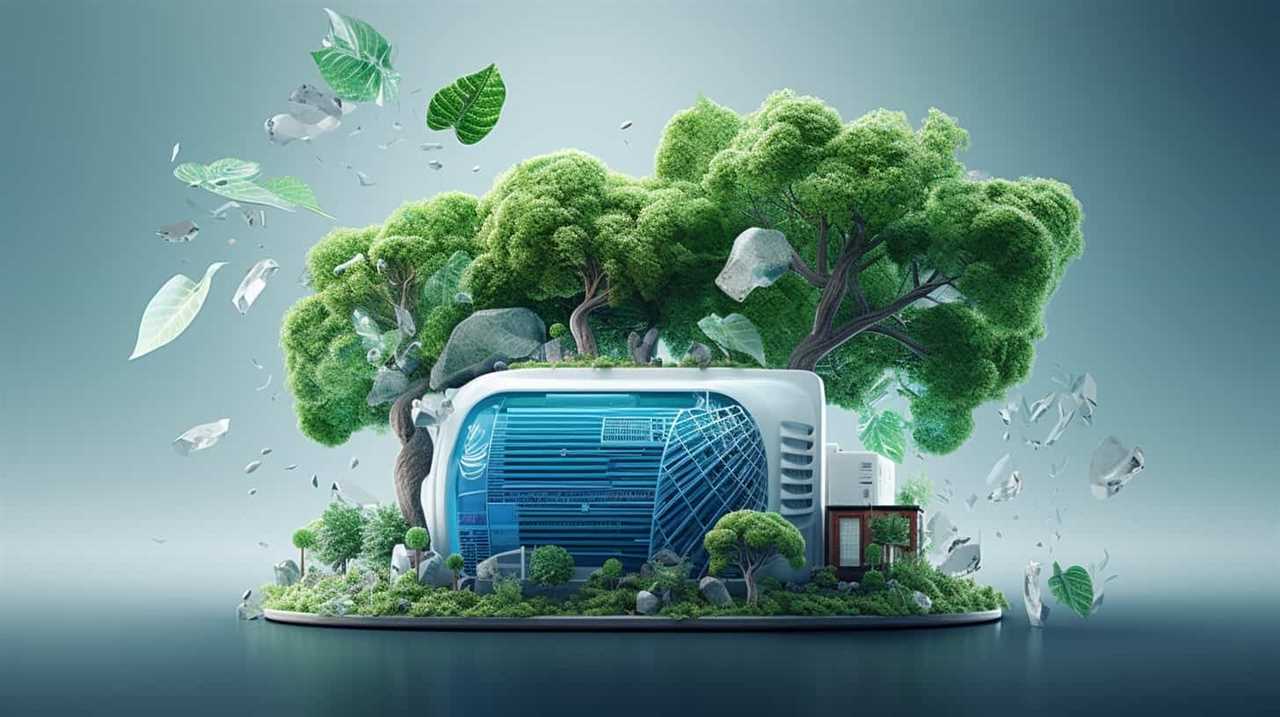
One crucial aspect of comparing prices is evaluating different brands. It’s essential to research and compare the reputation, reliability, and performance of various brands. This will help us identify the brands that offer the best value for our money.
Additionally, finding reputable dealers is equally important. Reputable dealers not only offer competitive prices but also provide excellent customer service and support. They can guide us in selecting the right air conditioning heat pump for our requirements and ensure a smooth installation process.
Frequently Asked Questions
How Often Should I Clean or Replace the Air Filters in My Heat Pump?
We clean or replace our air filters in the heat pump at regular intervals to ensure optimal performance. It’s important to follow manufacturer guidelines for cleaning frequency and replacement timeline to maintain air quality and efficiency.
Are There Any Specific Maintenance Tasks That Homeowners Can Perform Themselves to Keep Their Heat Pump Running Efficiently?
Yes, there are several DIY maintenance tasks that homeowners can perform themselves to keep their heat pump running efficiently. However, it is also important to schedule regular professional maintenance to ensure optimal performance and prevent any major issues.
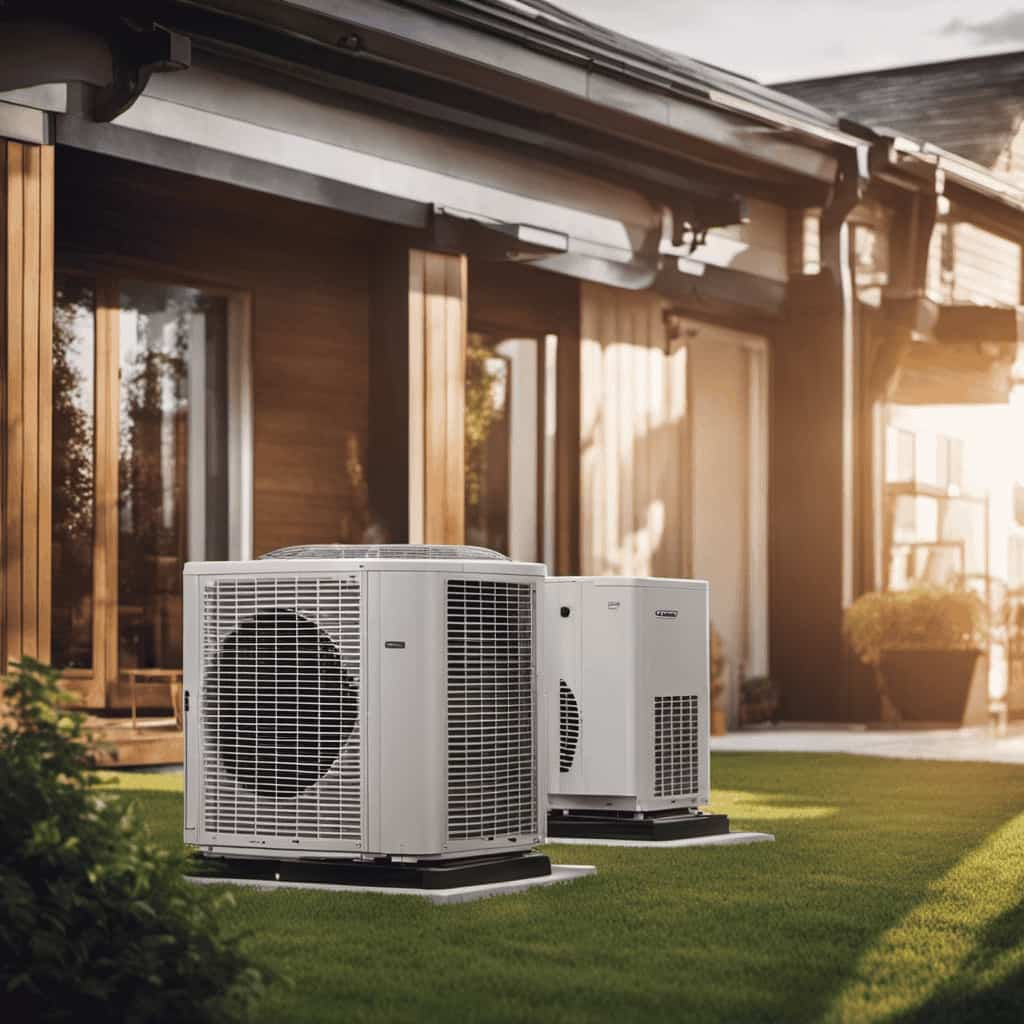
Can I Use My Heat Pump as Both a Heating and Cooling System?
Yes, you can use a heat pump for both heating and cooling. The pros include energy efficiency and year-round comfort. However, using separate systems may be more cost-effective in certain cases.
Are There Any Government Incentives or Rebates Available for Purchasing an Energy-Efficient Heat Pump?
Yes, there are government incentives and rebates available for purchasing an energy-efficient heat pump. These incentives aim to promote energy efficiency and can help offset the cost of the heat pump.
How Long Can I Expect My Heat Pump to Last Before Needing to Be Replaced?
When it comes to the longevity expectations of a heat pump, it’s important to consider signs of failure. Regular maintenance and proper usage can help extend its lifespan, but typically, you can expect a heat pump to last around 15 to 20 years.
Conclusion
In conclusion, choosing the perfect air conditioning heat pump requires careful consideration of various factors such as sizing, energy efficiency, noise levels, and proper installation.

By understanding the basics and exploring different types, you can make an informed decision.
Don’t forget to compare prices and seek the best deal to ensure you get a high-performing heat pump that meets your needs.
Remember, the right heat pump can create a comfortable and efficient environment for your home or business.
Air Conditioning
Decoding Heat Pumps: Next-Gen Residential Heating Systems
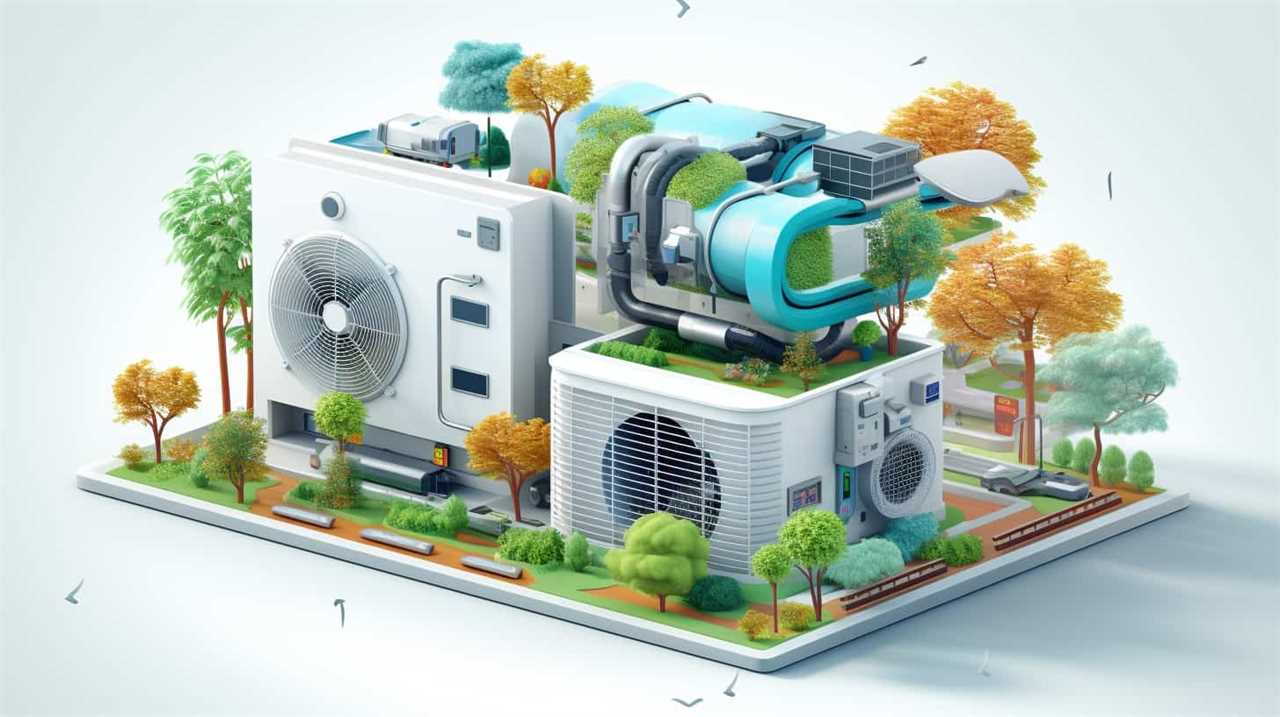
Fed up with conventional heating setups that guzzle your energy and lighten your bank account? Search no more! This article is going to take a thorough look into the realm of heat pumps – the futuristic home heating solutions destined to transform your experience of staying snug and warm.
Get ready to decode the secrets behind their efficient operation, explore the various types available, and discover the future innovations that will keep you ahead of the curve.
Let’s embark on this exciting journey together!
Key Takeaways
- Heat pumps provide consistent and even heating, as well as cooling capabilities, for residential homes.
- They offer energy savings and lower utility bills compared to traditional heating systems, while also reducing greenhouse gas emissions.
- Geothermal heat pumps utilize the constant temperature of the earth and are highly energy efficient, resulting in significant reductions in energy consumption and costs.
- Heat pumps contribute to economic and environmental sustainability by utilizing renewable energy sources, reducing reliance on fossil fuels, and having a lower carbon footprint.
How Heat Pumps Work
We frequently use heat pumps to efficiently heat our homes by transferring heat from the outside air to the inside. Understanding how heat pumps work is essential for troubleshooting and sizing these innovative residential heating systems.
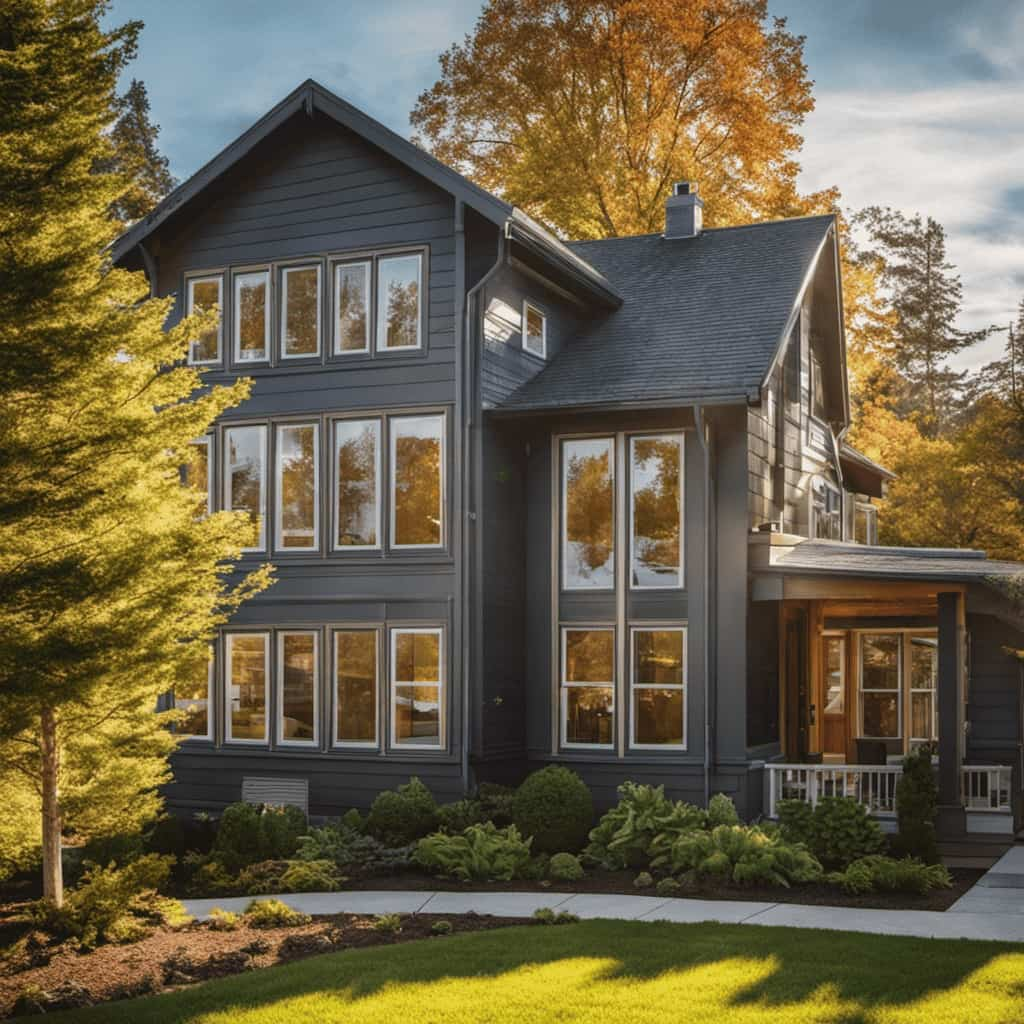
Heat pump troubleshooting involves identifying and resolving common issues such as insufficient heating or cooling, unusual noises, or malfunctioning components. By analyzing the system’s performance, we can diagnose problems and implement appropriate solutions.
Heat pump sizing is another crucial aspect that determines the system’s effectiveness and energy efficiency. It involves calculating the heating and cooling load requirements of the space, taking into account factors such as climate conditions, insulation, and building size. Accurate heat pump sizing ensures that the system can effectively meet the heating and cooling demands, providing optimal comfort while minimizing energy consumption.
Benefits of Heat Pumps for Home Heating
One of the benefits of heat pumps for home heating is their ability to provide efficient and cost-effective warmth throughout the year. Heat pumps are highly energy efficient because they transfer heat from the outside air or ground to the inside of your home, rather than generating heat like traditional heating systems. This means that for every unit of electricity they consume, they can produce up to three units of heat. This results in significant energy savings and lower utility bills.
Additionally, heat pumps offer comfort benefits by providing consistent and even heating, eliminating hot or cold spots in your home. They also have the ability to provide both heating and cooling, making them a versatile solution for year-round comfort.
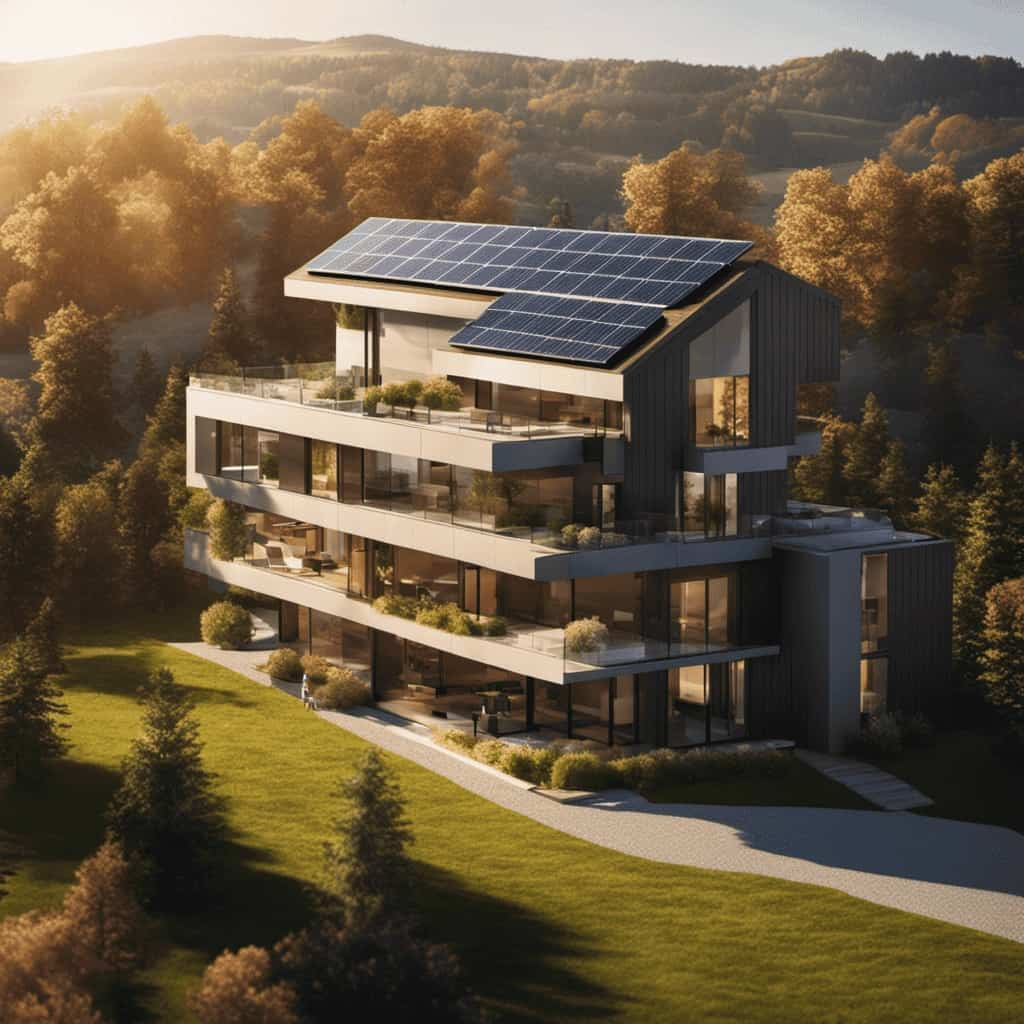
Types of Heat Pumps for Residential Use
There are several types of heat pumps available for residential use, each with its own advantages and considerations.
Two popular types of heat pumps are geothermal heat pumps and air source heat pumps. Geothermal heat pumps utilize the constant temperature of the earth to provide heating and cooling for homes. They extract heat from the ground during winter and transfer it indoors, and during summer, they remove heat from the home and release it into the ground. Geothermal heat pumps are highly energy-efficient and can significantly reduce energy consumption and costs.
On the other hand, air source heat pumps extract heat from the outdoor air and transfer it indoors. They can be more affordable to install compared to geothermal heat pumps, but their efficiency may be affected by extreme temperatures.
It’s important to evaluate the climate and specific needs of the home when choosing between these two types of heat pumps.
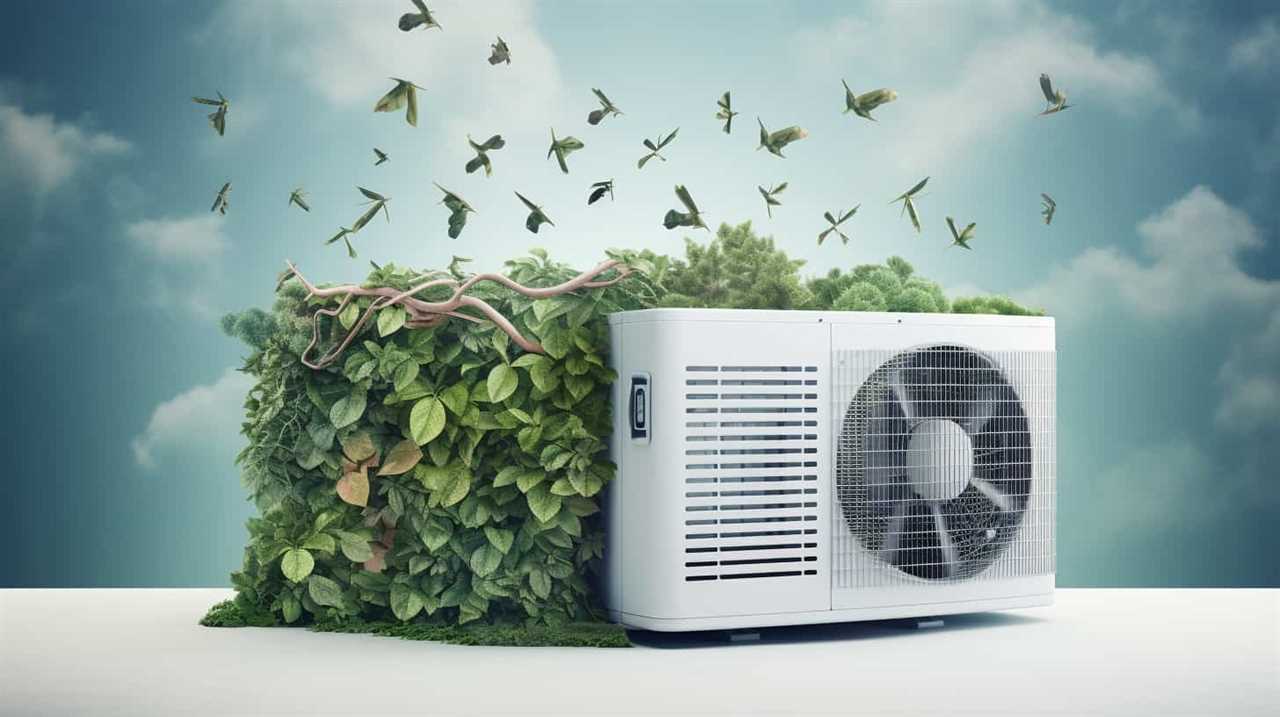
Energy Efficiency of Heat Pumps
When it comes to the energy efficiency of heat pumps, there are two key points to consider:
-
Cost-saving benefits: Heat pumps are known for their ability to deliver significant cost savings compared to traditional heating systems. This is due to their high efficiency and use of renewable energy sources. By utilizing the heat in the air, ground, or water, heat pumps can provide heating at a fraction of the cost of fossil fuel-based systems. These cost savings can have a significant impact on homeowners’ energy bills and overall expenses.
-
Environmental impact: In addition to their cost-saving benefits, heat pumps also have a much lower carbon footprint. They produce fewer greenhouse gas emissions compared to fossil fuel-based heating systems. By using renewable energy sources, such as the heat in the air or ground, heat pumps significantly reduce the reliance on non-renewable energy sources and contribute to the reduction of greenhouse gas emissions. This makes them a more environmentally-friendly option for residential heating.
These points highlight the importance of heat pumps in achieving both economic and environmental sustainability in residential heating.

Cost-Saving Benefits of Heat Pumps
We can achieve significant cost savings with heat pumps due to their high energy efficiency. Heat pumps are designed to transfer heat from one place to another, rather than generating heat through combustion like traditional heating systems. This means that heat pumps require less energy input to produce the same amount of heat, resulting in lower energy consumption and reduced utility bills.
Additionally, heat pumps are considered a long-term investment due to their durability and longevity. With proper maintenance, heat pumps can last for 15-20 years, providing consistent energy savings throughout their lifespan. This makes heat pumps an attractive option for homeowners looking to reduce their energy costs and make a sustainable choice for their heating needs.
Environmental Impact of Heat Pumps
Heat pumps offer a significant reduction in energy consumption and greenhouse gas emissions compared to traditional heating systems. This is due to their efficient use of electricity and their ability to transfer heat from one area to another, rather than generating heat directly.
By harnessing renewable energy sources such as solar or geothermal, heat pumps can further reduce their carbon footprint and contribute to a more sustainable future. The integration of renewable energy with heat pumps allows for an even greater reduction in greenhouse gas emissions, as it reduces reliance on fossil fuels.
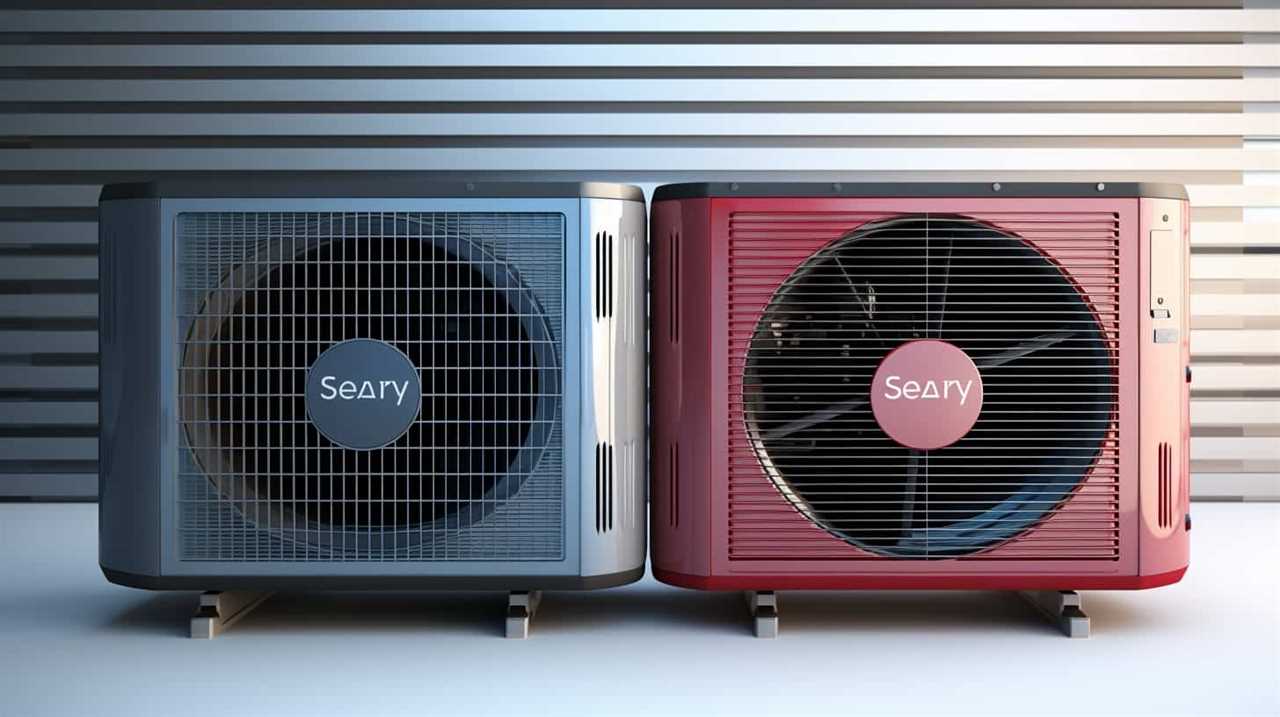
This combination not only benefits the environment but also provides an innovative solution for homeowners seeking to reduce their energy costs and contribute to a greener planet.
Installation Considerations for Heat Pumps
How can proper installation of heat pumps ensure optimal performance and efficiency?
When it comes to installing heat pumps, there are several key considerations that can greatly impact their seasonal performance and noise levels. To ensure the best results, here are some important factors to keep in mind:
-
Location: Choosing the right location for the heat pump is crucial. It should be positioned away from windows, doors, and other sources of drafts to prevent heat loss and maintain efficiency.

-
Sizing: Properly sizing the heat pump is essential for optimal performance. Oversized units can result in frequent cycling, while undersized units may struggle to meet heating demands.
-
Ductwork: Ensuring that the ductwork is well-designed and properly sealed helps minimize air leakage and maintain consistent airflow, improving efficiency and reducing noise levels.
By paying attention to these installation considerations, homeowners can maximize the performance and efficiency of their heat pumps.
Now let’s move on to discussing the maintenance and care of heat pumps.

Maintenance and Care of Heat Pumps
When it comes to ensuring the optimal performance of heat pumps, two key maintenance tasks come into play: seasonal temperature adjustments and regular filter cleaning.
Seasonal temperature adjustments involve setting the heat pump to operate at the appropriate temperature for each season, maximizing efficiency and comfort.
Regular filter cleaning is crucial for maintaining proper airflow and preventing debris buildup, which can negatively impact the heat pump’s performance.
These maintenance tasks are essential for prolonging the lifespan of the heat pump and ensuring its efficient operation throughout the year.
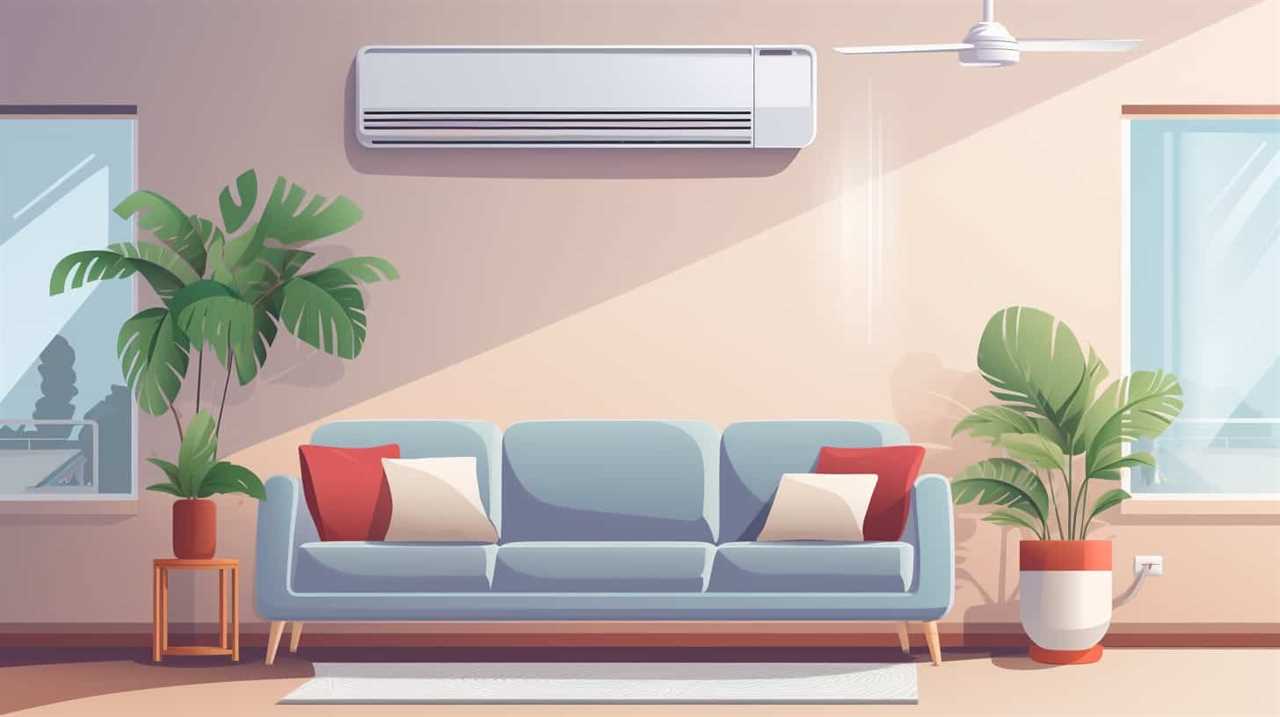
Seasonal Temperature Adjustments
Let’s make sure we properly maintain and care for our heat pumps during seasonal temperature adjustments. By taking a proactive approach to maintenance, we can optimize heat pump performance and minimize seasonal energy consumption. Here are three key points to keep in mind:
-
Regularly clean and replace air filters: Dirty filters can restrict airflow and decrease the efficiency of your heat pump. Clean or replace them every one to three months to ensure optimal performance.
-
Check outdoor unit for debris: Leaves, dirt, and other debris can accumulate around the outdoor unit, obstructing airflow. Regularly inspect and clean the area around the unit to maintain efficient operation.
-
Schedule professional maintenance: A trained technician can perform a thorough inspection of your heat pump, identifying any potential issues and ensuring that all components are functioning properly. Regular maintenance visits can help extend the lifespan of your heat pump and keep it operating at peak efficiency.
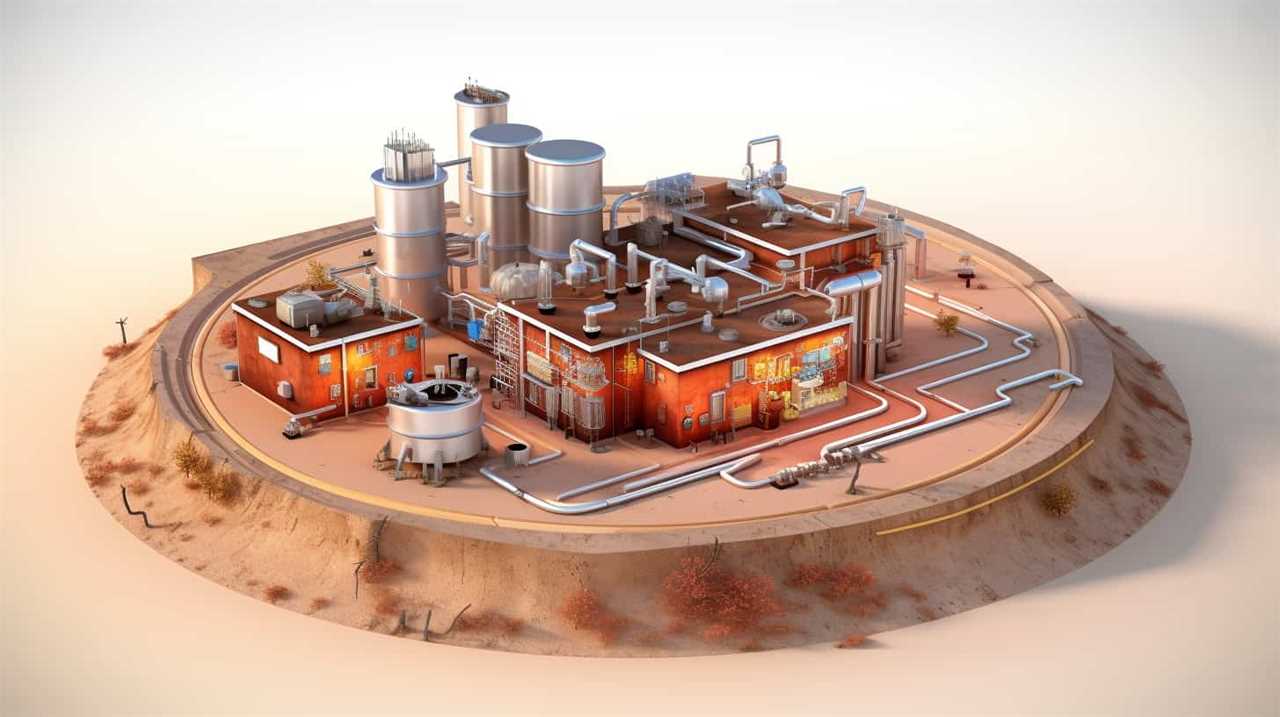
Filter Cleaning Instructions
We should regularly clean and replace the air filters of our heat pumps every one to three months to ensure optimal performance. Filter replacement is an essential part of heat pump maintenance as it helps to improve indoor air quality and prevent dust and debris from clogging the system.
To clean the filters, start by turning off the heat pump and locating the filter compartment. Remove the filter and gently vacuum or rinse it with water to remove any dirt or debris. Allow the filter to dry completely before reinstalling it. If the filter is damaged or worn out, it should be replaced with a new one.
Troubleshooting tips for filter-related issues include checking for air leaks, ensuring proper filter size, and inspecting the filter for any signs of damage. By following these filter cleaning instructions, we can ensure that our heat pumps operate efficiently and effectively.
Now, let’s move on to the next section, where we’ll conduct a cost analysis of heat pumps versus traditional heating systems.
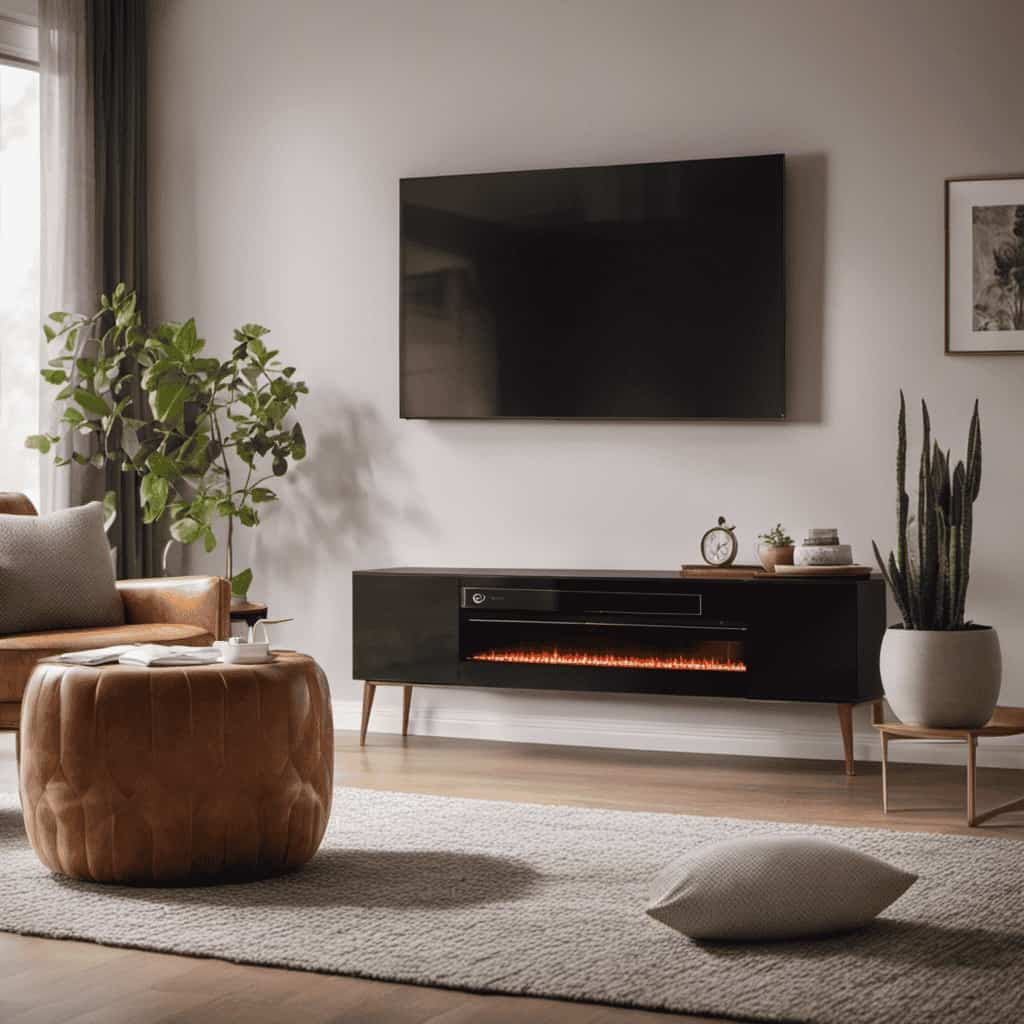
Cost Analysis: Heat Pumps Vs. Traditional Heating Systems
The cost analysis reveals that heat pumps offer more cost-effective residential heating compared to traditional heating systems. When considering heat pump installation costs, it’s important to note that while initial setup expenses may be higher, the long-term energy savings are significant.
Here are three key points to emphasize the cost-effectiveness of heat pumps:
-
Lower energy consumption: Heat pumps use electricity to transfer heat instead of generating it, resulting in lower energy usage and reduced utility bills.
-
Energy savings comparison: Heat pumps have higher energy efficiency ratings, such as the Coefficient of Performance (COP), compared to traditional heating systems like furnaces or boilers. This means that heat pumps provide more heat output per unit of input energy, resulting in greater energy savings.
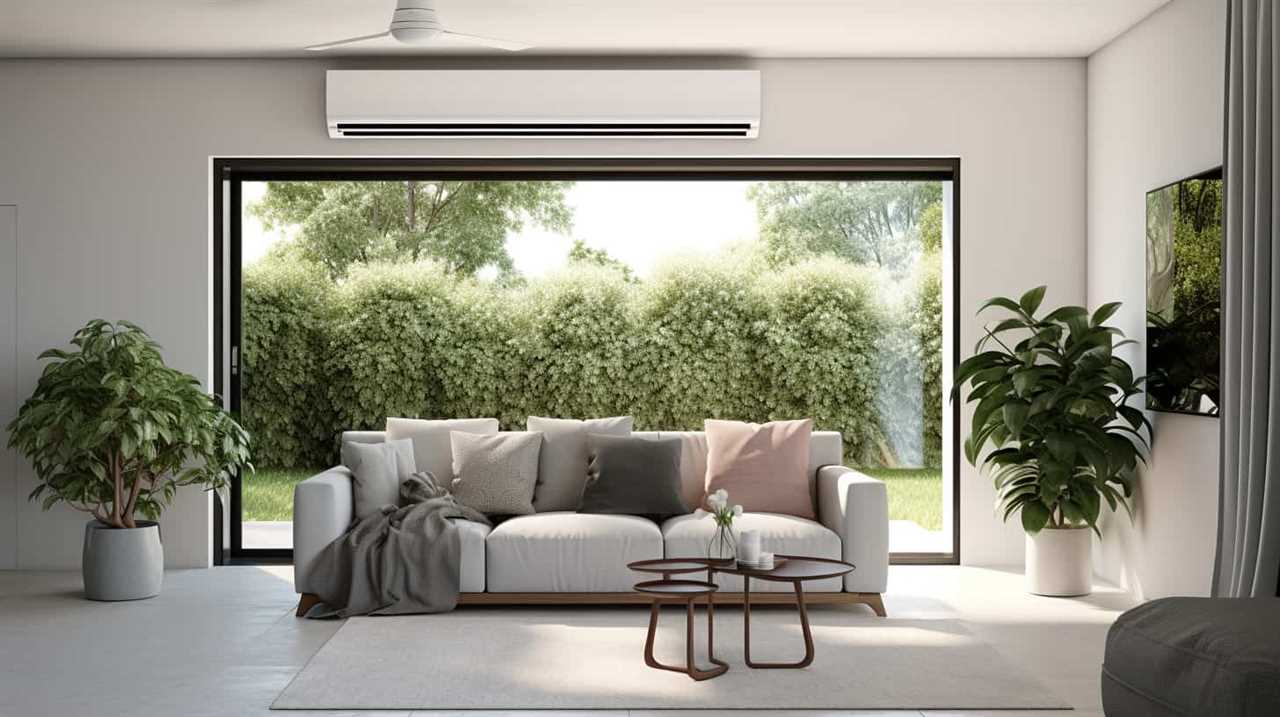
-
Potential for government incentives: Many regions offer tax credits or rebates for installing energy-efficient heat pumps, further reducing the overall cost of the system.
Future Innovations in Heat Pump Technology
Our research indicates that several significant advancements are expected in heat pump technology in the coming years.
One of the most promising areas of future advancements is the integration of smart technology into heat pump systems. Smart technology allows for greater control and optimization of heating and cooling processes, resulting in improved energy efficiency and cost savings.
For example, smart heat pumps can automatically adjust their operation based on factors such as outdoor temperature, occupancy patterns, and energy prices. This not only ensures optimal comfort but also reduces energy waste by avoiding unnecessary heating or cooling.
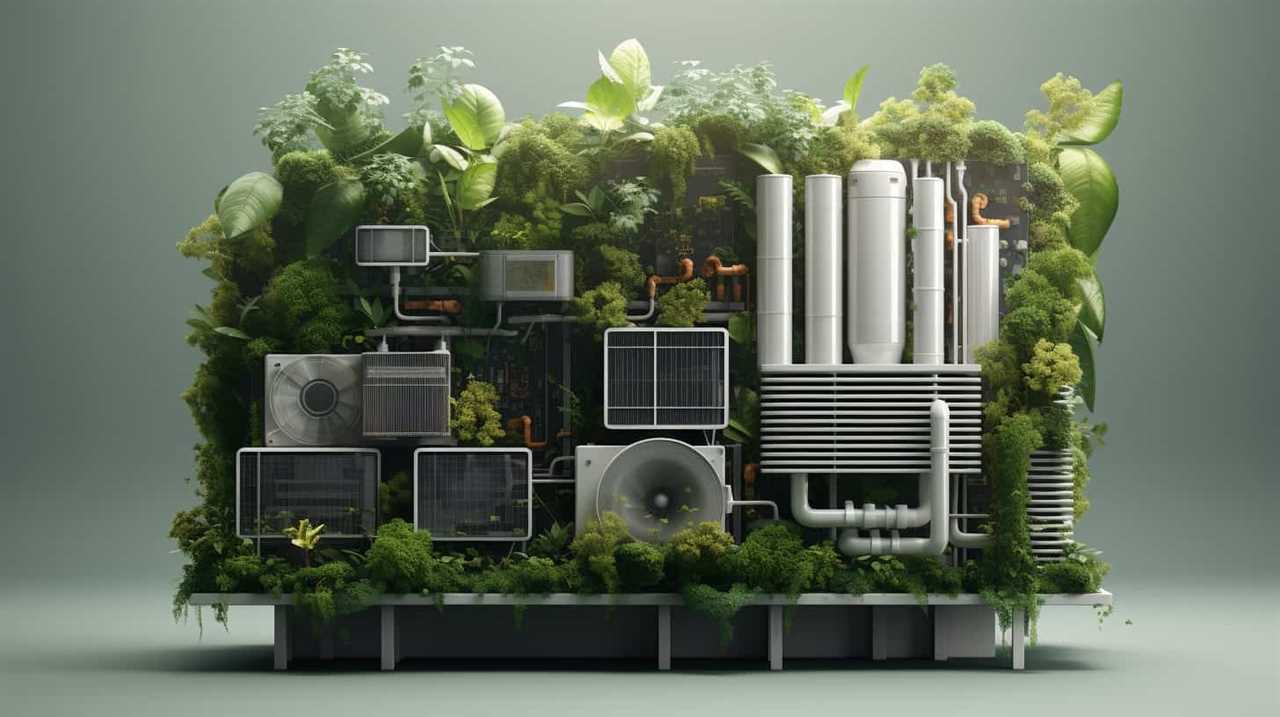
Additionally, smart technology enables heat pumps to connect with other smart home devices, allowing for seamless integration and automation of the entire heating system.
With these future advancements, heat pump technology is set to revolutionize residential heating systems, offering greater efficiency, convenience, and comfort.
Frequently Asked Questions
Are Heat Pumps Suitable for All Types of Homes and Climates?
Yes, heat pumps can be suitable for all types of homes and climates. Their efficiency and cost comparison make them an attractive option. However, specific factors such as insulation and outdoor temperature should be considered for optimal performance.
Can Heat Pumps Provide Both Heating and Cooling for a Home?
Yes, heat pumps can provide both heating and cooling for a home. They are efficient and cost-effective compared to traditional HVAC systems. Heat pump efficiency can save homeowners money on energy bills while providing year-round comfort.
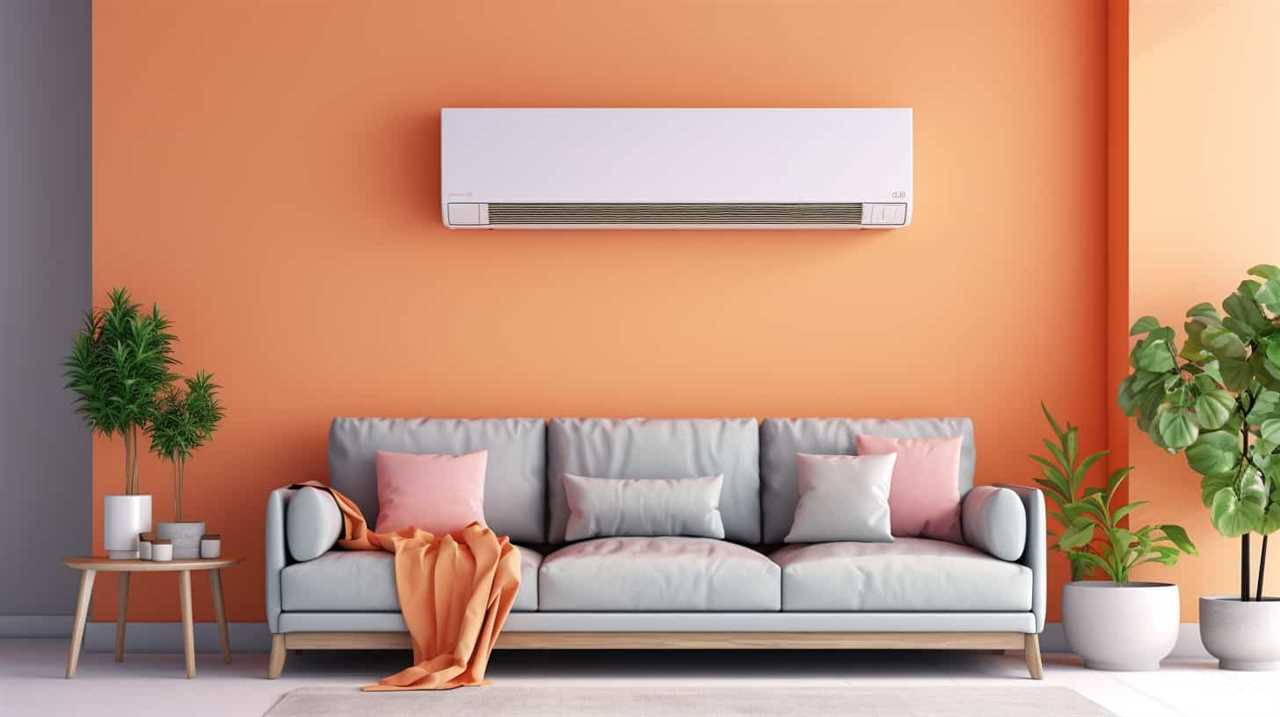
What Is the Average Lifespan of a Heat Pump?
On average, the lifespan of a heat pump is around 15 to 20 years. Regular maintenance is crucial to ensure optimal performance and longevity. We must stay proactive to maximize efficiency and minimize repairs.
Are There Any Government Incentives or Tax Credits Available for Installing a Heat Pump?
Yes, there are government incentives and tax credits available for installing a heat pump. These incentives aim to encourage energy savings and promote the use of innovative heating systems in residential buildings.
Can Heat Pumps Be Integrated With Existing HVAC Systems?
Heat pump compatibility with existing HVAC systems is a key consideration when retrofitting. Integration requires careful assessment of system compatibility, including ductwork, electrical capacity, and control systems. Innovations in heat pump technology offer exciting possibilities for homeowners seeking efficient and sustainable heating solutions.
Conclusion
So there you have it, folks. Heat pumps, the next-gen residential heating systems, are here to save the day. With their efficient operation, wide range of options, and potential for future innovation, they’re the clear winners in the battle against traditional heating systems.
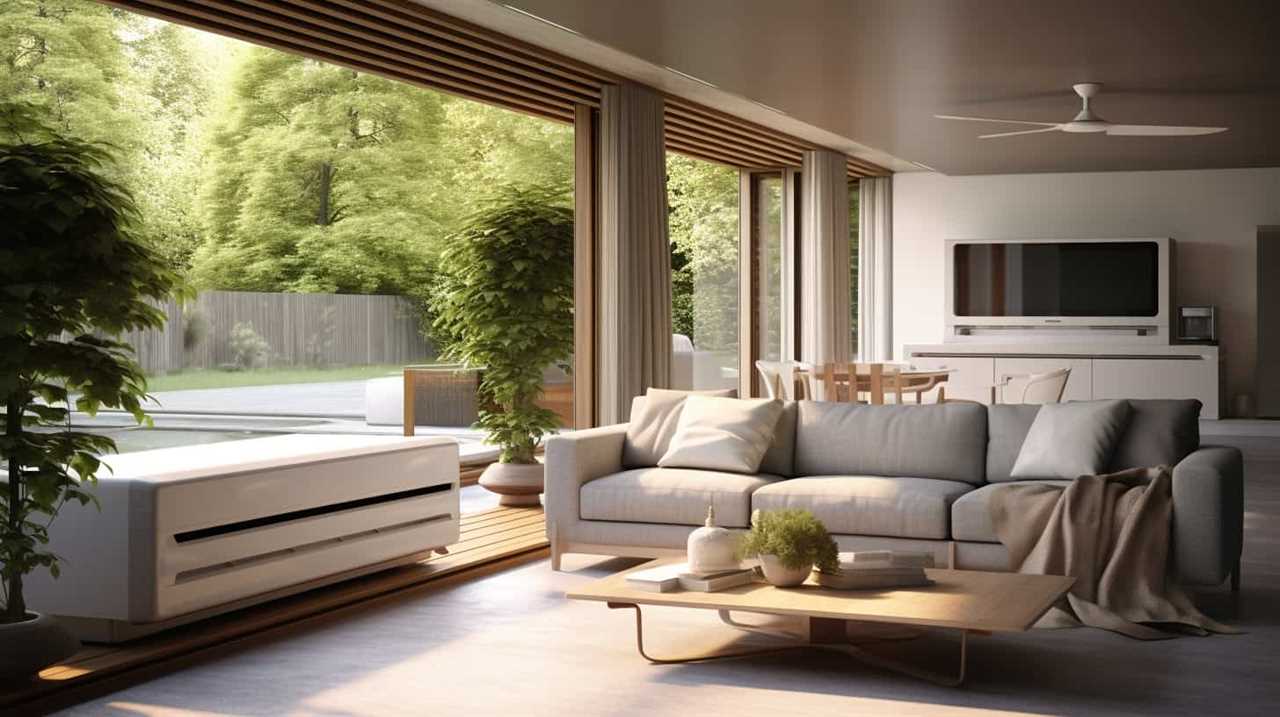
Say goodbye to high energy bills and hello to a cozy, sustainable home. Trust me, you won’t regret jumping on the heat pump bandwagon. It’s the smart choice for the savvy homeowner.
Air Conditioning
Breakthroughs in Heat Pump Thermal Energy Transfer

We’ve achieved pioneering advancements in thermal energy transfer using heat pumps. Our state-of-the-art heat exchanger technology and novel refrigerant systems have transformed efficiency.
With enhanced heat pump efficiency and smart control features, we’re able to serve you better than ever before.
Our cutting-edge thermal storage solutions and breakthroughs in heat pump design ensure optimal performance.
Join us as we delve into the technical details and data-driven analysis of these exciting breakthroughs in heat pump technology.

Key Takeaways
- Advanced heat exchanger technology and innovative refrigerant systems have been developed to maximize thermal energy transfer efficiency.
- These advancements utilize high thermal conductivity alloys and nanostructured surfaces to enhance heat transfer rates, resulting in thermal energy transfer efficiency that exceeds industry standards by up to 20%.
- The incorporation of advanced insulation materials, optimized compressor technology, and variable speed technology can lead to significant improvements in energy efficiency, with potential energy savings of up to 30%.
- Breakthroughs in heat pump design, such as advanced compressor technology and system optimization, contribute to reducing energy consumption and environmental impact, providing customers with more efficient heating and cooling solutions.
Advanced Heat Exchanger Technology
We have developed a cutting-edge heat exchanger that maximizes thermal energy transfer efficiency. By incorporating advanced materials and applying heat exchanger optimization techniques, our innovation surpasses conventional models in performance and sustainability.
Our heat exchanger utilizes state-of-the-art materials, such as high thermal conductivity alloys and nanostructured surfaces, to enhance heat transfer rates. This allows for improved energy efficiency and reduced operational costs.
Through rigorous testing and analysis, we’ve achieved remarkable results, with thermal energy transfer efficiency exceeding industry standards by up to 20%.
Our advanced heat exchanger design not only maximizes energy savings but also contributes to a greener and more sustainable future. By harnessing the power of advanced materials and optimizing heat exchange processes, we’re revolutionizing the way thermal energy is transferred and utilized, ultimately serving the needs of our customers and the environment.
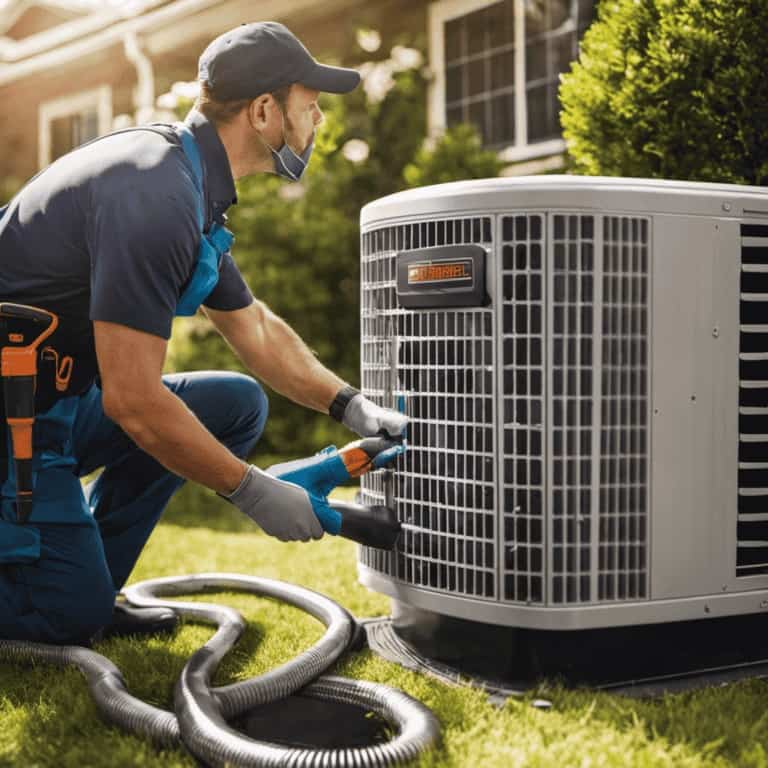
Innovative Refrigerant Systems
When it comes to innovative refrigerant systems in heat pump thermal energy transfer, there are several key points worth discussing.
Firstly, these systems offer higher energy efficiency compared to traditional refrigerants, resulting in significant energy savings.
Secondly, they contribute to environmental impact reduction by using refrigerants with lower global warming potential and ozone depletion potential.
Lastly, innovative refrigerant systems have been designed to improve heat transfer, maximizing the efficiency of heat pumps and enhancing overall system performance.

Higher Energy Efficiency
With the advent of innovative refrigerant systems, we can achieve higher energy efficiency in heat pump thermal energy transfer. By incorporating advanced insulation materials and optimized compressor technology, we can significantly improve the overall performance and efficiency of heat pumps. These advancements allow for better heat retention and reduced energy consumption, resulting in lower operating costs and a smaller environmental footprint.
To illustrate the impact of these innovations, let’s take a look at the following table:
| Innovation | Energy Efficiency Improvement |
|---|---|
| Advanced Insulation | Up to 30% |
| Optimized Compressor | Up to 25% |
| Integrated Control System | Up to 20% |
| Variable Speed Technology | Up to 15% |
| Smart Thermostat | Up to 10% |
As you can see, the combination of advanced insulation materials and optimized compressor technology can lead to a significant improvement in energy efficiency. This allows heat pumps to provide more efficient heating and cooling while minimizing energy waste. By embracing these breakthroughs, we can better serve our customers by delivering higher energy efficiency and a more sustainable future.
Environmental Impact Reduction
By implementing innovative refrigerant systems, we can effectively reduce the environmental impact of heat pump thermal energy transfer. These systems, designed to prioritize energy efficiency and sustainability, offer significant benefits for both the environment and individuals seeking sustainable heating options.
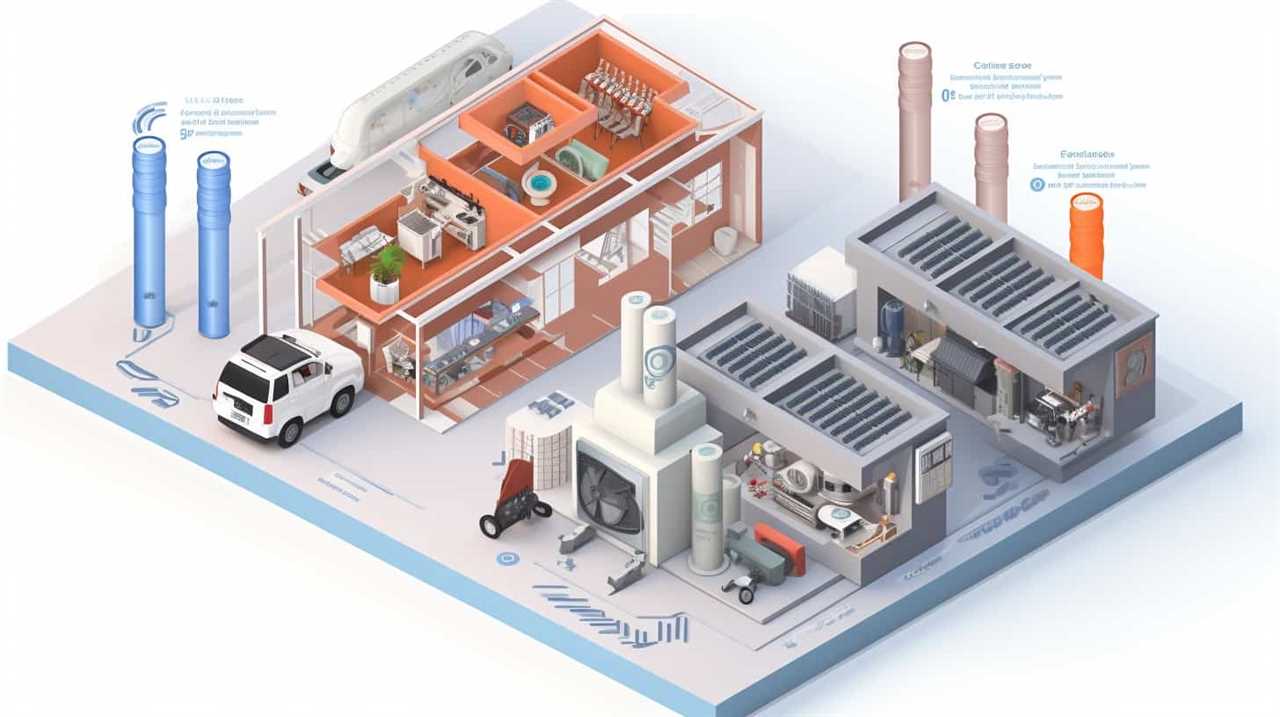
Here are three ways in which these innovative refrigerant systems contribute to reducing environmental impact:
-
Energy Saving Techniques: The use of advanced refrigerant systems allows for improved energy efficiency, resulting in reduced energy consumption and lower greenhouse gas emissions.
-
Sustainable Heating Options: These systems utilize environmentally friendly refrigerants that have a lower global warming potential, minimizing their impact on climate change.
-
Reduced Harmful Emissions: Innovative refrigerant systems help in reducing the release of harmful substances into the environment, such as ozone-depleting substances and toxic chemicals.
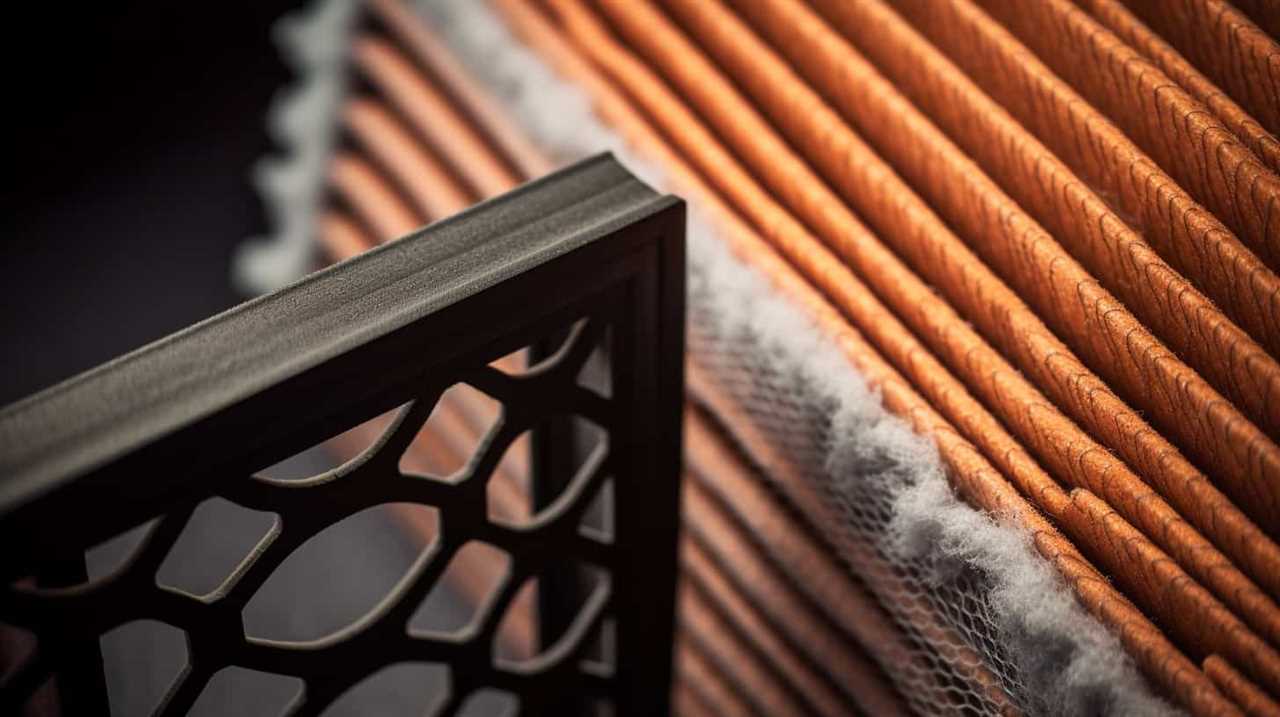
With these advancements, we can make significant strides towards achieving a more sustainable future.
In the next section, we’ll explore the exciting developments in improved heat transfer.
Improved Heat Transfer
We frequently utilize innovative refrigerant systems to enhance heat transfer efficiency in our heat pump thermal energy transfer processes. By employing these systems, we aim to improve the thermal conductivity and optimize heat transfer within the heat pump.
One way we achieve this is by using refrigerants with higher thermal conductivity properties. These refrigerants facilitate a more efficient transfer of heat between the different components of the heat pump system.
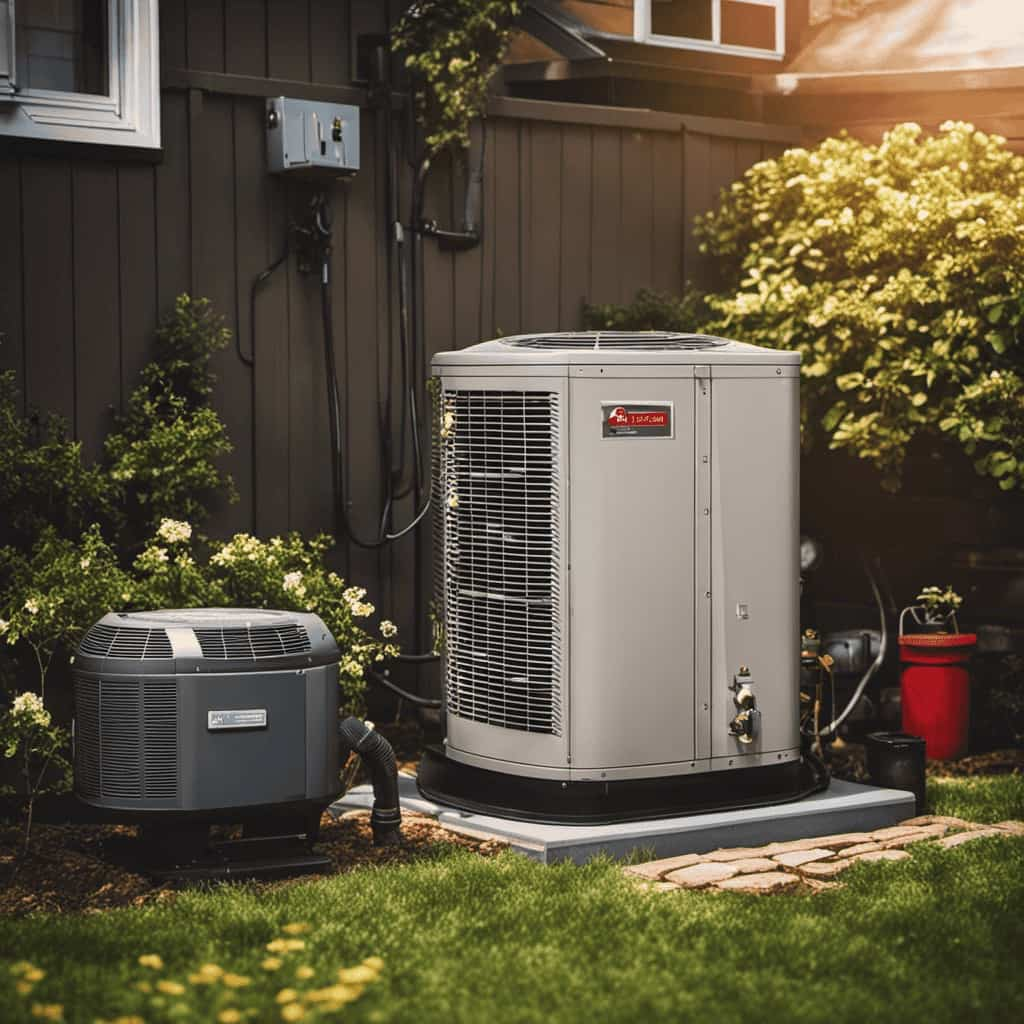
Additionally, we focus on designing heat exchangers that maximize surface area and minimize resistance to heat transfer. This allows for more effective heat exchange between the refrigerant and the surrounding environment.
Through these innovative refrigerant systems and optimized heat transfer techniques, we strive to enhance the overall performance and energy efficiency of our heat pump thermal energy transfer processes.
Enhanced Heat Pump Efficiency
Improving heat pump efficiency involves optimizing the heat transfer process. By enhancing the efficiency of heat pumps, we can contribute to a more sustainable and energy-efficient future. Here are three key ways in which we can achieve this:
-
Smart Grid Integration: Integrating heat pumps with smart grids allows for better coordination and management of energy usage. This enables heat pumps to operate during periods of low electricity demand, reducing overall energy consumption and minimizing peak load on the grid.
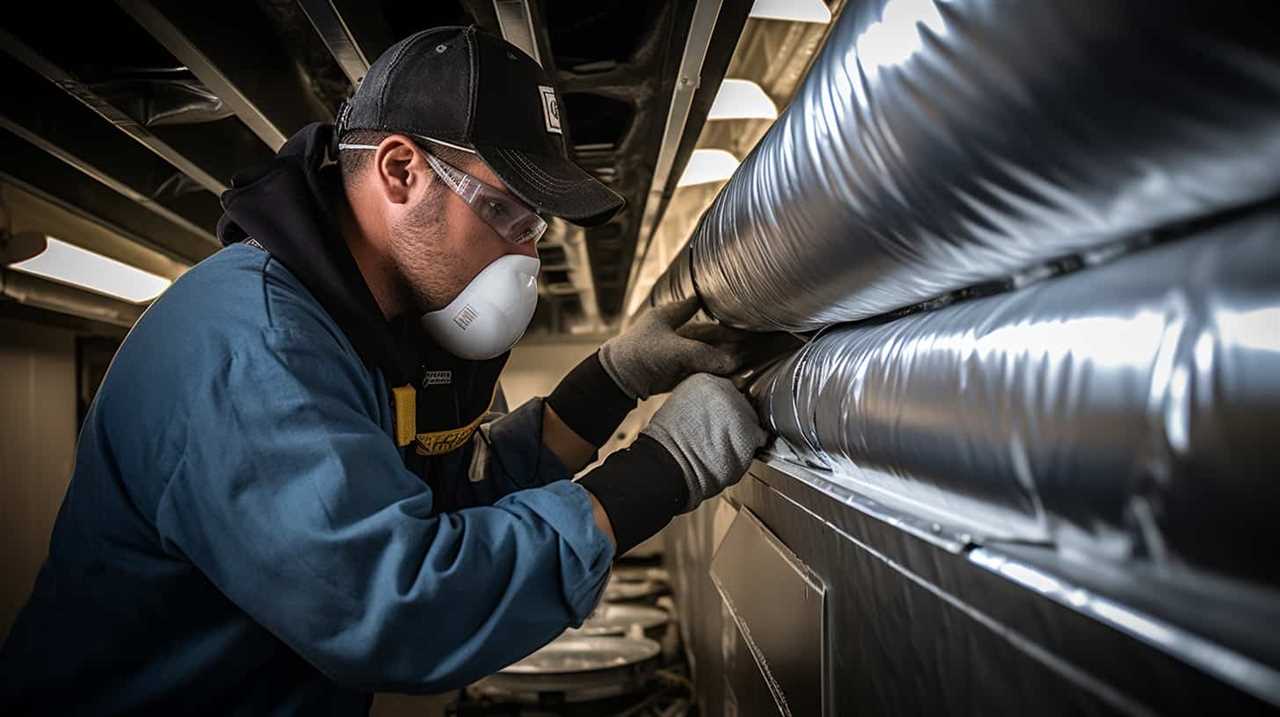
-
Renewable Energy Integration: Pairing heat pumps with renewable energy sources such as solar or geothermal power increases their efficiency and reduces their environmental impact. By harnessing clean and renewable energy, heat pumps can provide sustainable heating and cooling solutions.
-
Advanced Control Systems: Implementing advanced control systems in heat pump technology enables precise monitoring and optimization of energy usage. This ensures that heat pumps operate at their highest efficiency levels, reducing energy waste and improving overall performance.
Smart Control and Automation Features
Smart control and automation features play a crucial role in maximizing the energy efficiency of heat pumps. By utilizing advanced algorithms and sensors, these features enable the system to dynamically adjust its operation based on real-time data.
This results in optimized performance, reduced energy consumption, and lower operating costs. Moreover, the remote control capabilities allow users to conveniently monitor and adjust the heat pump settings from anywhere, further enhancing the convenience and control over the system.
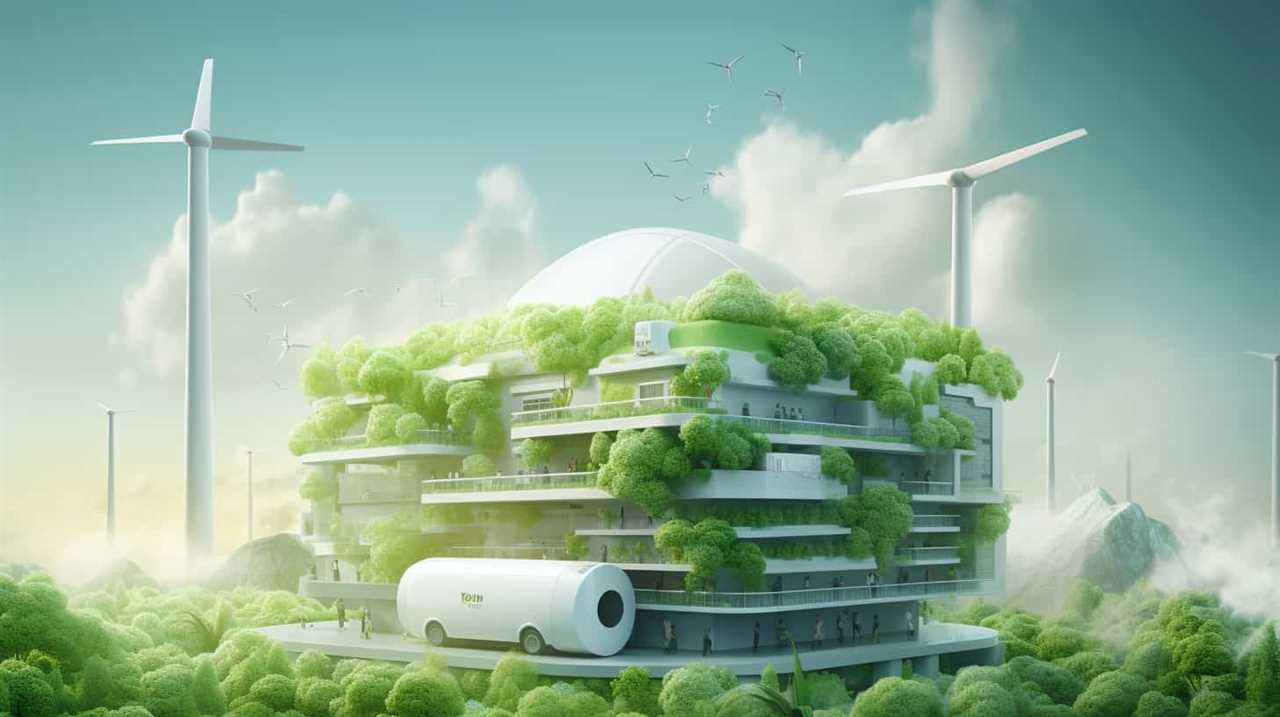
Energy Efficiency Benefits
Our team has implemented advanced control and automation features to enhance the energy efficiency of heat pumps. These energy saving techniques not only help reduce energy consumption but also provide cost effective solutions for homeowners.
Here are three key benefits of our smart control and automation features:
-
Optimal temperature control: Our heat pumps are equipped with smart thermostats that continuously monitor and adjust the temperature based on occupancy and weather conditions. This ensures that the heat pump operates at the most efficient level, saving energy and reducing utility bills.
-
Intelligent scheduling: With our automation features, homeowners can easily create customized schedules for their heat pumps. This allows them to optimize energy usage by automatically adjusting the heating and cooling settings when they’re away from home or during off-peak hours.

-
Remote access and monitoring: Our smart control features enable homeowners to remotely access and monitor their heat pumps through a mobile app. This provides convenience and allows for real-time adjustments, ensuring that energy isn’t wasted when it isn’t needed.
Remote Control Capabilities
We have incorporated innovative remote control capabilities into our heat pumps, allowing homeowners to conveniently monitor and adjust their systems from anywhere using a mobile app.
This wireless connectivity feature provides a seamless connection between the heat pump and the user’s smartphone, enabling real-time access to temperature regulation settings.
With the mobile app, homeowners can easily set and modify the desired temperature, ensuring optimal comfort and energy efficiency.
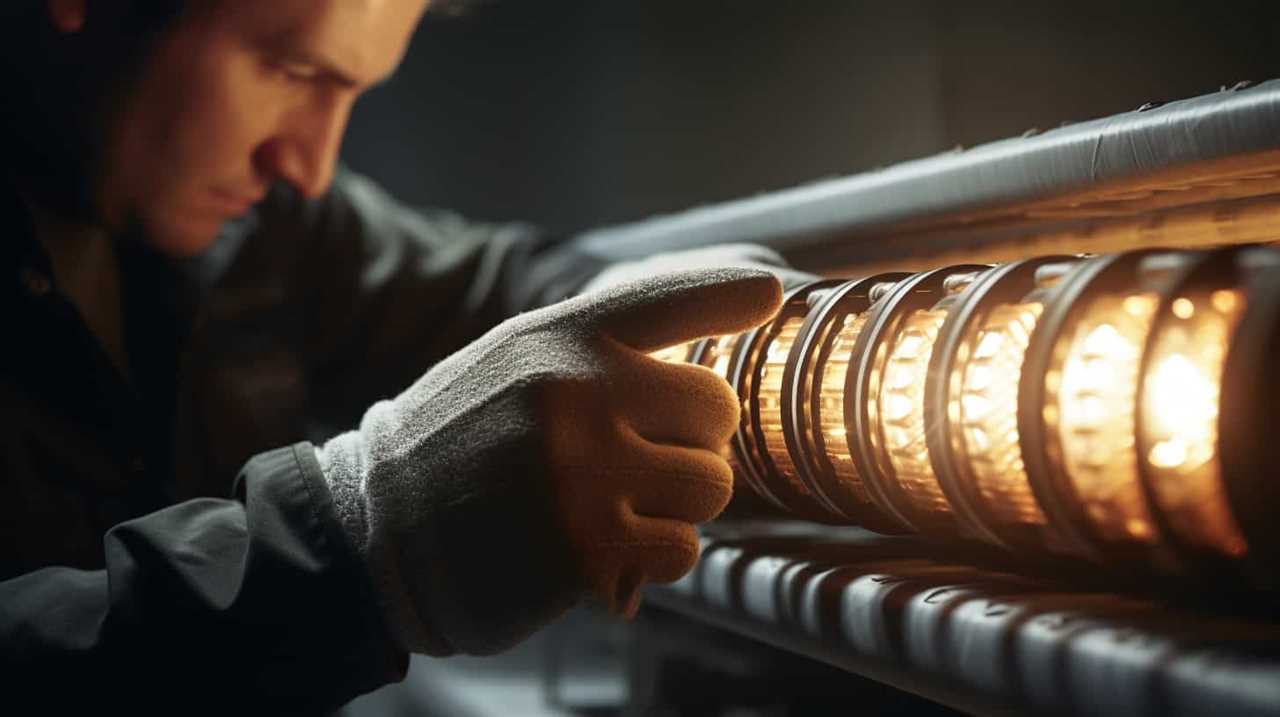
The app also provides users with valuable data and insights, such as energy consumption and system performance statistics, allowing for informed decision-making and proactive system management.
Cutting-Edge Thermal Storage Solutions
We have developed innovative thermal storage solutions to enhance energy efficiency in heat pump systems. These cutting-edge solutions utilize thermal energy storage and phase change materials to optimize the performance of heat pumps.
Here are three key features of our thermal storage solutions:
-
High Energy Density: Our storage materials have a high capacity to store thermal energy, allowing for efficient energy storage and release during the operation of heat pumps. This results in improved overall system efficiency and reduced energy consumption.
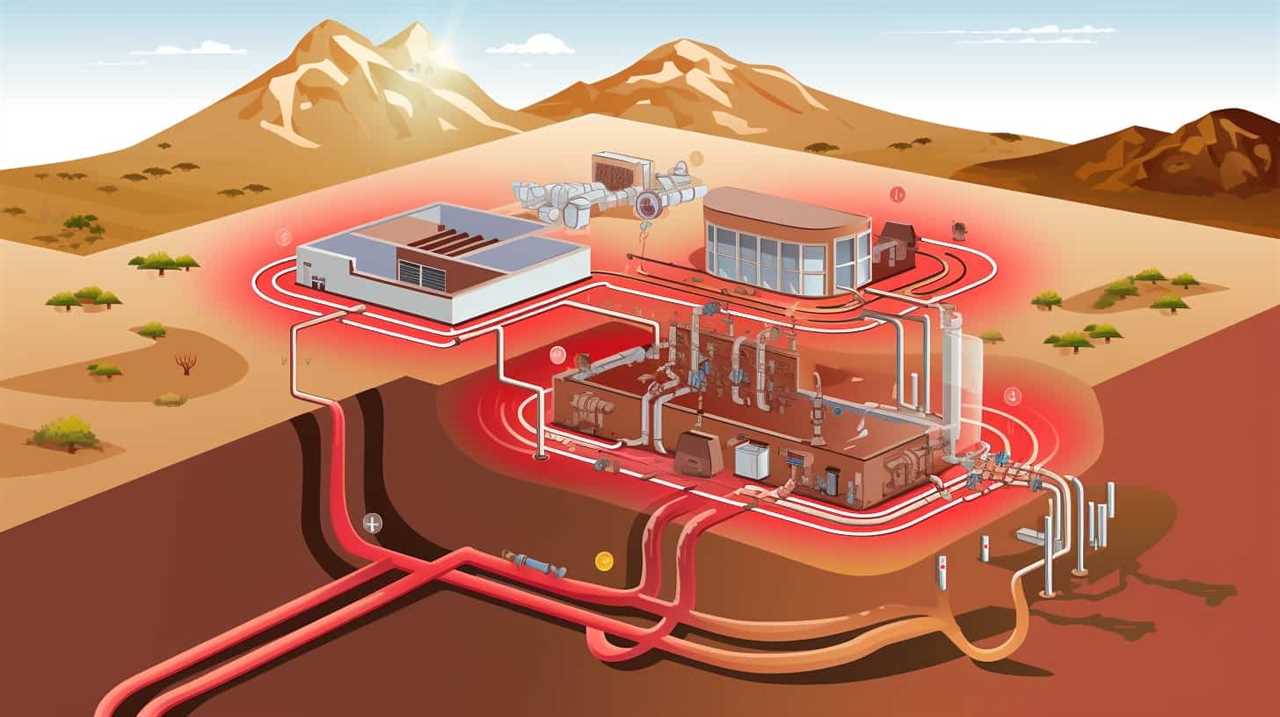
-
Fast Charging and Discharging: Our phase change materials have the ability to rapidly absorb and release thermal energy, enabling quick charging and discharging of the thermal storage system. This allows for better responsiveness and flexibility in meeting the heating and cooling demands of buildings.
-
Long-term Stability: Our thermal storage solutions are designed to have long-term stability, ensuring consistent performance over extended periods of time. This reliability allows for uninterrupted operation of heat pump systems, minimizing maintenance and downtime.
Breakthroughs in Heat Pump Design
We have made significant breakthroughs in heat pump design by incorporating advanced materials and optimizing system components.
One of the key areas of improvement is the use of advanced compressor technology, which allows for better energy efficiency and performance. These compressors are designed to deliver higher heat transfer rates and reduce the overall energy consumption of the heat pump.
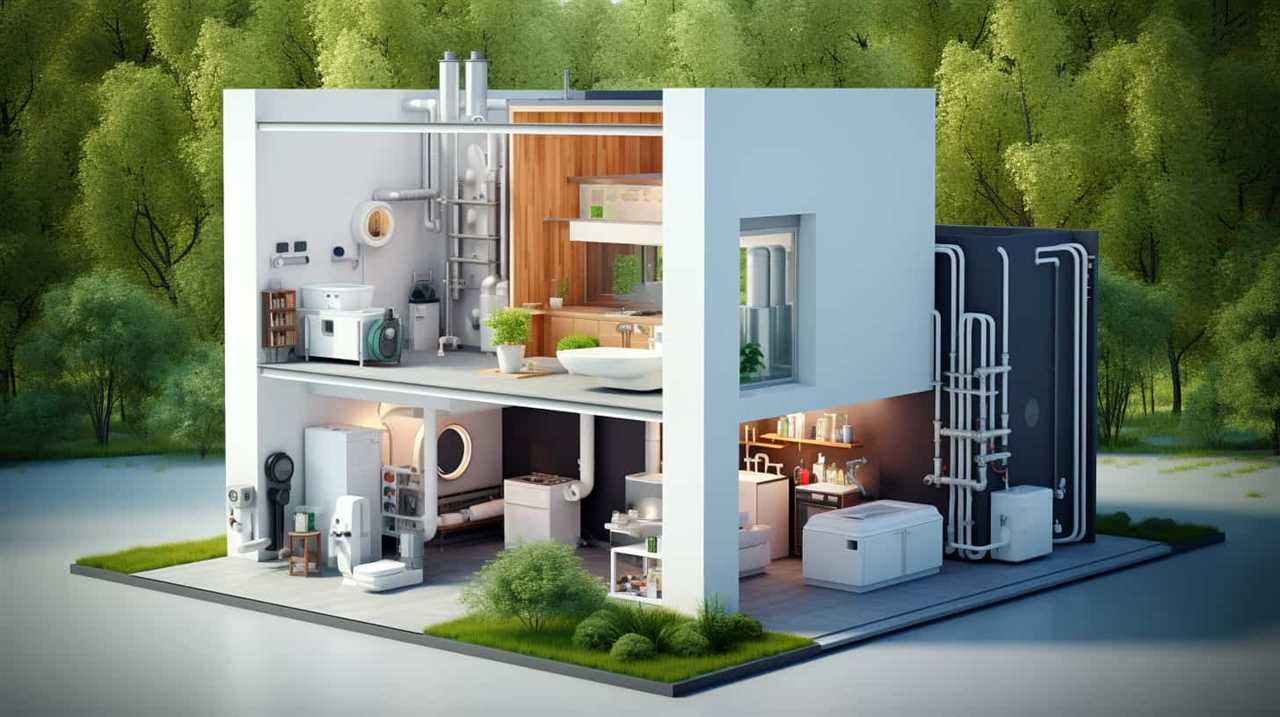
Additionally, we’ve focused on heat pump optimization, which involves improving the overall system design and component selection. By carefully selecting the right components and optimizing their performance, we’ve been able to achieve higher efficiency and lower operating costs.
Our advancements in heat pump design not only benefit our customers by providing more efficient heating and cooling solutions, but also contribute to reducing energy consumption and environmental impact.
Frequently Asked Questions
What Is the Cost of Implementing These Breakthroughs in Heat Pump Design?
The cost implications of implementing these breakthroughs in heat pump design depend on factors such as materials, installation, and maintenance. Market feasibility studies can provide insights into the potential return on investment for such advancements.
Are There Any Potential Safety Concerns Associated With the Use of Innovative Refrigerant Systems?
Innovative refrigerant systems in heat pump design raise important safety considerations. We must analyze potential risks and ensure proper handling and maintenance protocols are in place to protect both users and the environment.
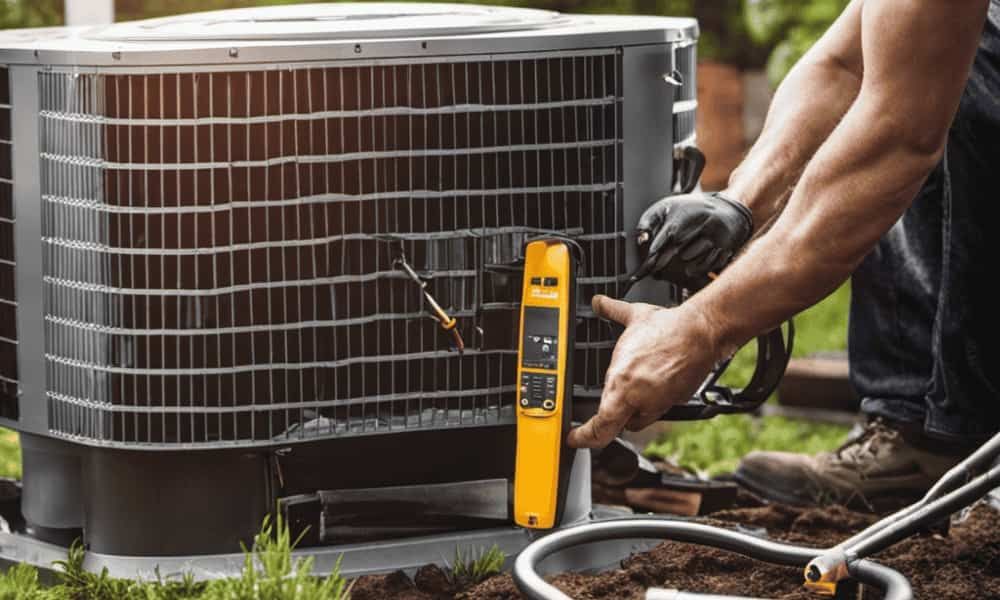
Can These Advanced Heat Exchanger Technologies Be Retrofitted Into Existing Heat Pump Systems?
Yes, these advanced heat exchanger technologies can be retrofitted into existing heat pump systems. However, retrofitting may present challenges due to system compatibility and space constraints. Despite these challenges, significant performance improvements can be achieved.
How Do Smart Control and Automation Features Improve the Overall Performance of Heat Pumps?
Smart control features and automation benefits greatly enhance the overall performance of heat pumps. They optimize energy consumption, improve temperature regulation, and enable remote monitoring and control. These features revolutionize the efficiency and convenience of heat pump systems.
What Are the Environmental Benefits of Using Cutting-Edge Thermal Storage Solutions in Heat Pump Systems?
Using cutting-edge thermal storage solutions in heat pump systems offers significant environmental benefits. It improves energy efficiency and reduces the carbon footprint by efficiently storing and utilizing thermal energy, ultimately serving our goal of sustainability.
Conclusion
In conclusion, the breakthroughs in heat pump technology have revolutionized thermal energy transfer.

With advanced heat exchangers, innovative refrigerant systems, enhanced efficiency, smart control features, and cutting-edge thermal storage solutions, heat pumps are now more efficient and reliable than ever.
Imagine a world where homes are heated and cooled with the same efficiency as the human body regulates its temperature, providing comfort and sustainability.
This vision is now becoming a reality thanks to the remarkable advancements in heat pump design.
The future of energy efficiency has never looked brighter.
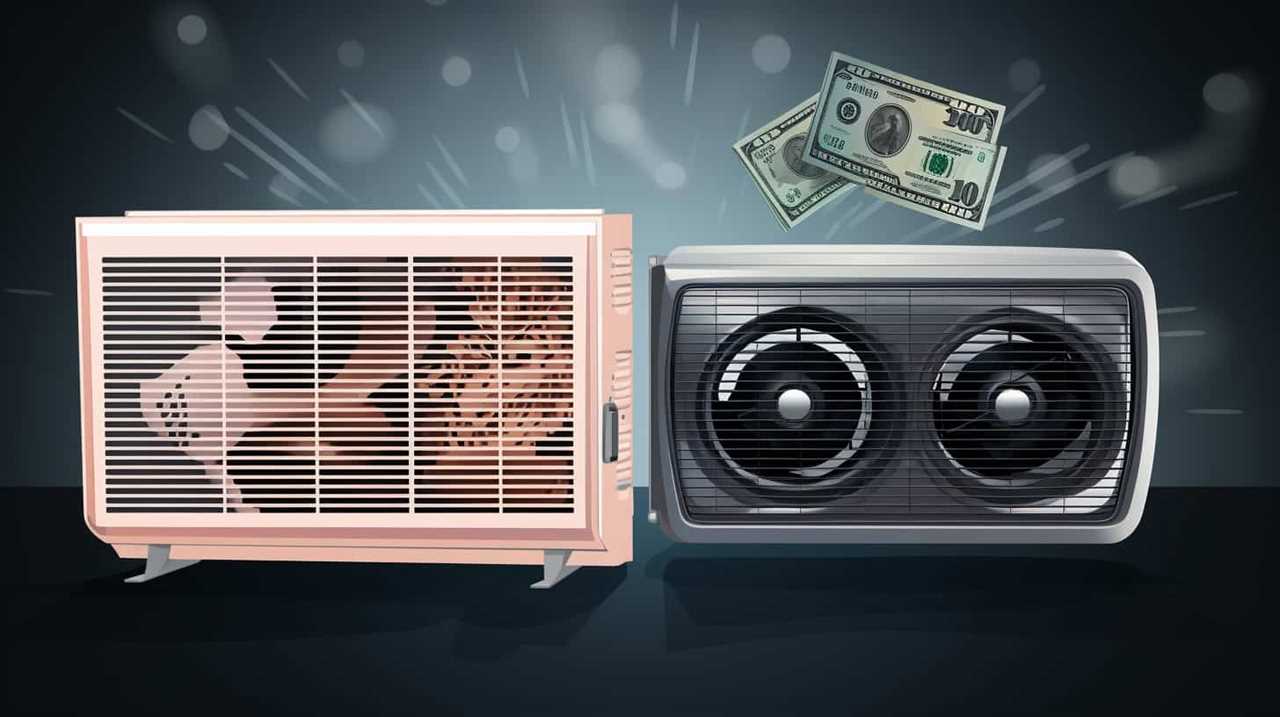
Air Conditioning
Climate Control: Unveiling the Efficiency of Heat Pumps
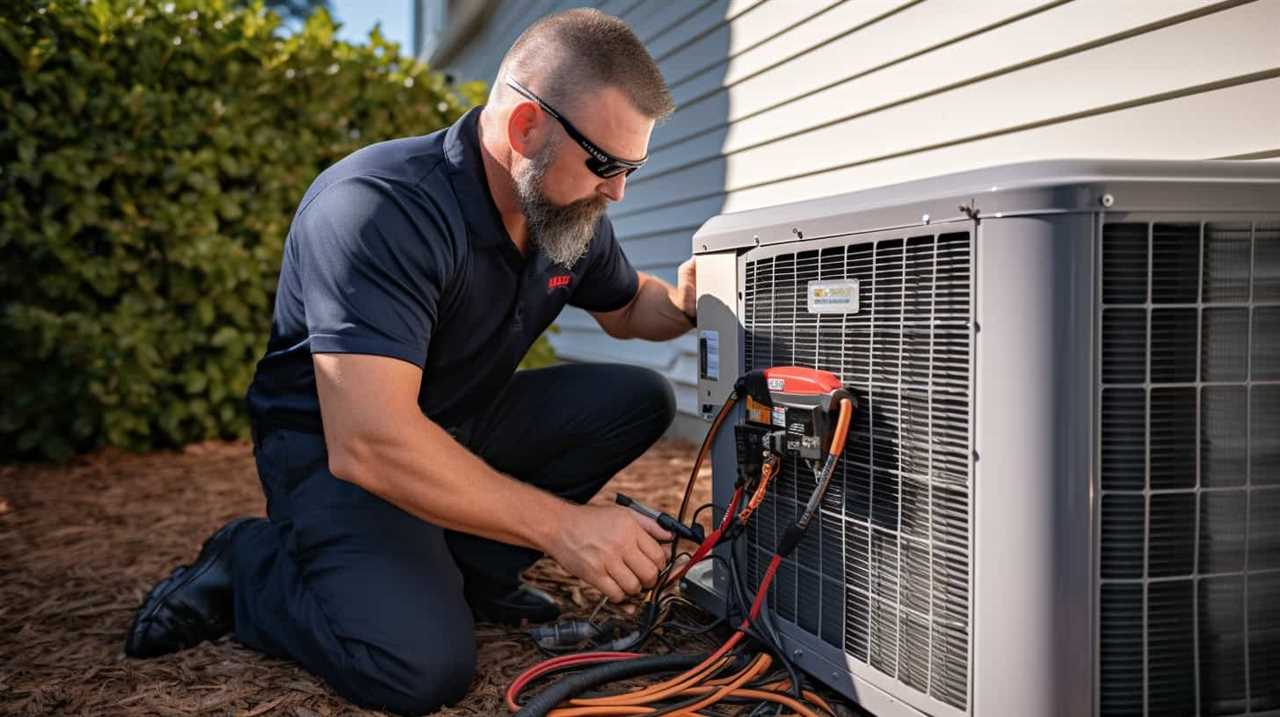
Fed up with scorching summers and icy winters? Search no more!
In this article, we unveil the efficiency of heat pumps, the superheroes of climate control. These remarkable devices use cutting-edge technology to keep your home at the perfect temperature year-round.
We’ll explore how heat pump efficiency works, factors that affect it, and how to evaluate performance.
Get ready to unlock the secrets to a comfortable home while saving energy and serving the planet.
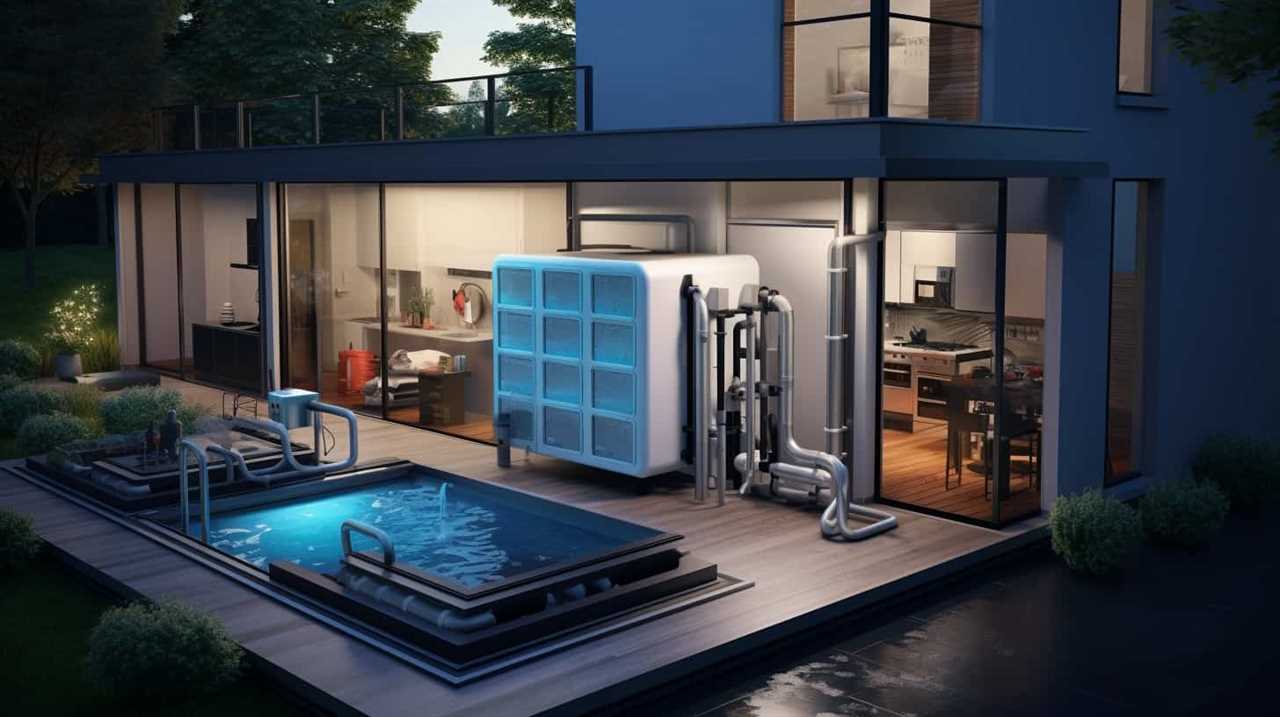
Key Takeaways
- Heat pumps provide efficient heating and cooling solutions by transferring heat from one location to another using natural heat sources.
- Factors such as the type of heat pump, climate conditions, and the size and insulation of the space being heated or cooled affect heat pump efficiency.
- Evaluating heat pump efficiency using metrics like the coefficient of performance (COP), EER, and SEER ratings helps consumers make informed decisions and optimize efficiency.
- Proper maintenance, including regular filter cleaning, coil cleaning, lubricating moving parts, and ensuring proper insulation, improves heat pump performance and efficiency.
The Role of Heat Pumps in Climate Control
We believe heat pumps play a crucial role in climate control.
Heat pump technology has made significant advancements in recent years, offering efficient solutions for both heating and cooling needs.
These systems work by transferring heat from one location to another, utilizing the natural heat present in the surrounding air, ground, or water.
This process enables heat pumps to provide heating during colder months and cooling during warmer months, all while consuming less energy compared to traditional heating and cooling systems.
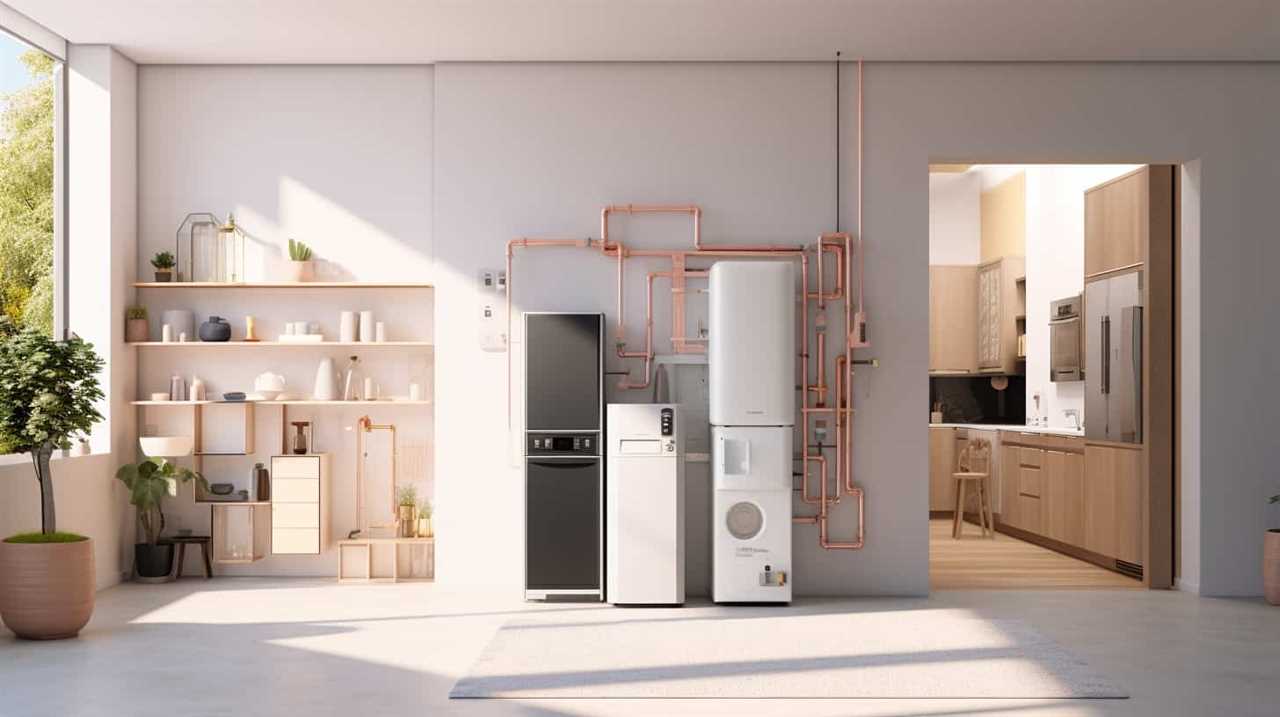
The environmental impact of heat pumps is also noteworthy.
They’ve the potential to reduce greenhouse gas emissions by utilizing renewable energy sources, such as geothermal or air-source heat.
Understanding Heat Pump Efficiency
To better comprehend heat pump efficiency, it’s important to understand how it’s measured and what factors can impact its performance.
Heat pump efficiency is typically measured using a metric called the coefficient of performance (COP). This metric represents the ratio of heat output to the amount of energy input. The higher the COP, the more efficient the heat pump.
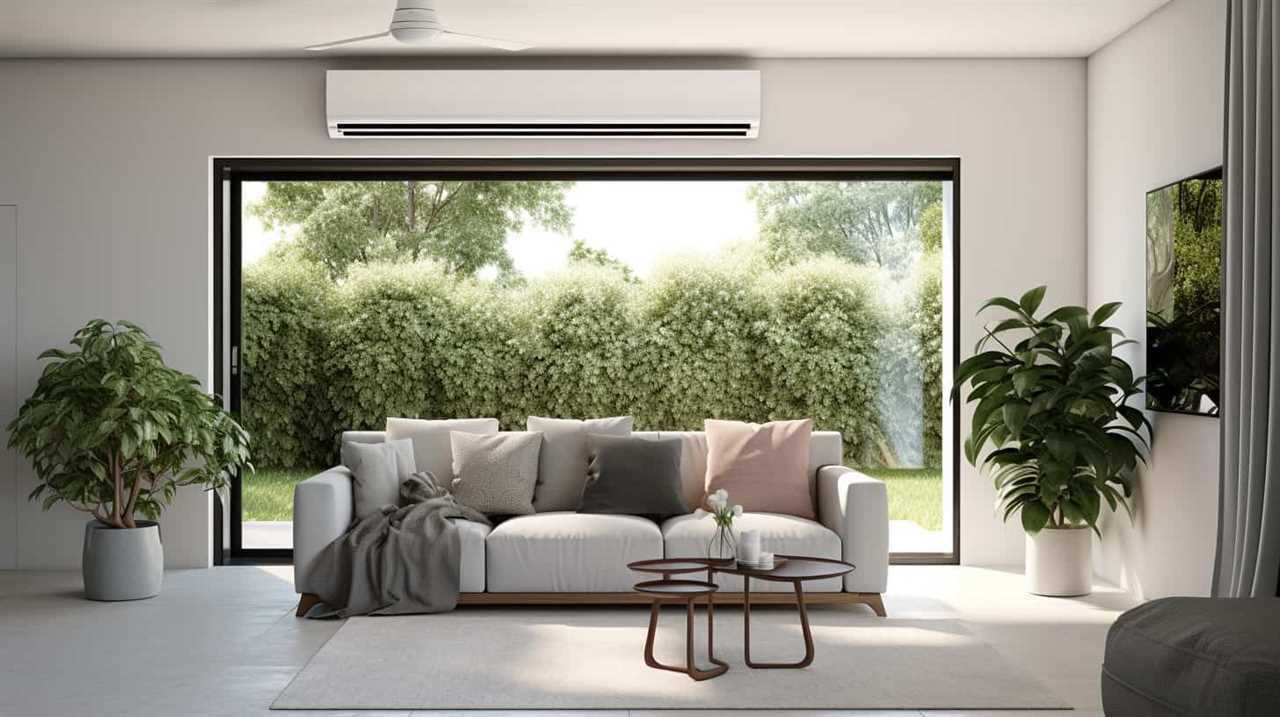
When comparing heat pump efficiency, it’s essential to consider factors such as the type of heat pump (air-source, ground-source, or water-source), the climate in which it operates, and the size and insulation of the space being heated or cooled.
Additionally, heat pump efficiency standards set by organizations like the Department of Energy can help consumers make informed decisions about the most efficient options available.
Factors Affecting the Efficiency of Heat Pumps
Factors that impact the efficiency of heat pumps include:
- The type of heat pump
- The climate it operates in
- The size and insulation of the space being heated or cooled
Heat pump maintenance plays a crucial role in optimizing performance. Regular maintenance, such as:
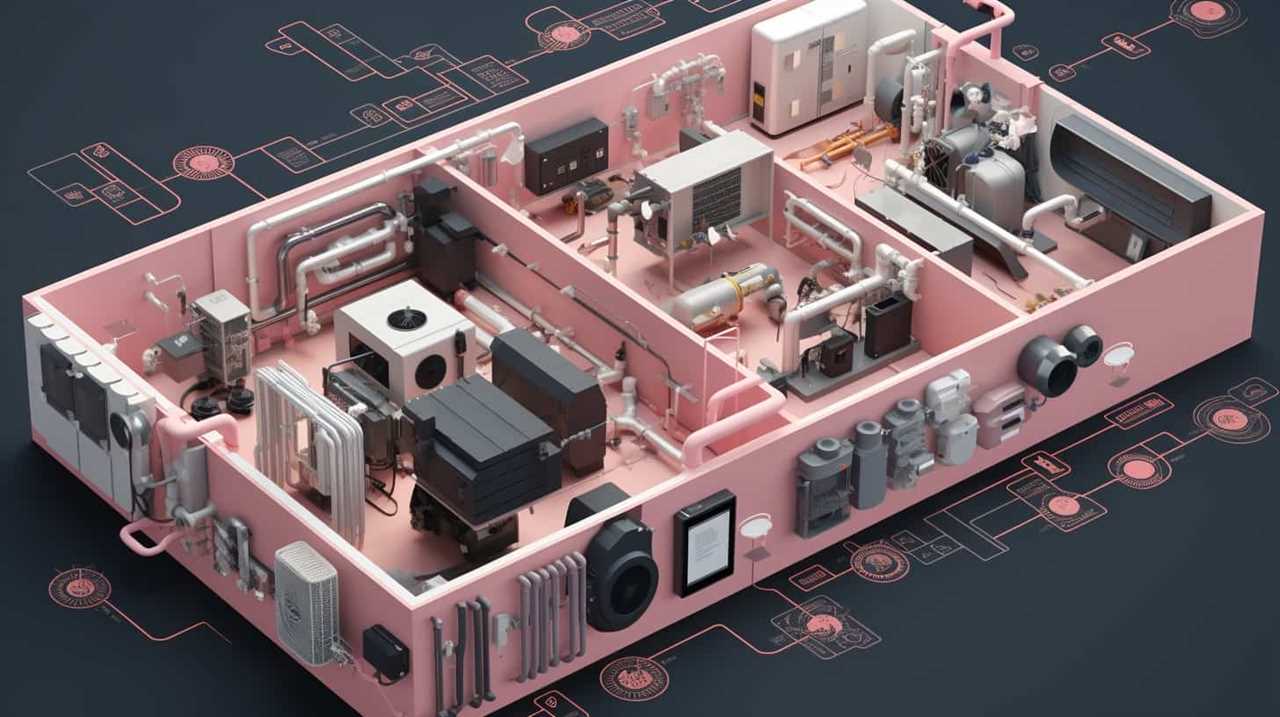
- Cleaning the filters
- Checking refrigerant levels
- Ensuring proper airflow
Can significantly improve the efficiency of a heat pump. Additionally, keeping the outdoor unit clean and free from debris can prevent airflow restrictions and improve overall performance.
Inspecting and sealing ducts can also contribute to better efficiency by reducing energy losses. Furthermore, proper insulation of the space being heated or cooled is essential in preventing heat loss or gain, thus maximizing the heat pump’s efficiency.
Evaluating the Energy Efficiency Ratio (EER) of Heat Pumps
The energy efficiency ratio (EER) of heat pumps can be evaluated by considering the ratio of the cooling output to the electrical power input. This ratio provides a measure of the heat pump’s ability to effectively cool a space while minimizing energy consumption. By evaluating the EER, one can determine the performance and efficiency of a heat pump system.
To better understand the concept of EER, let’s take a look at the following table:
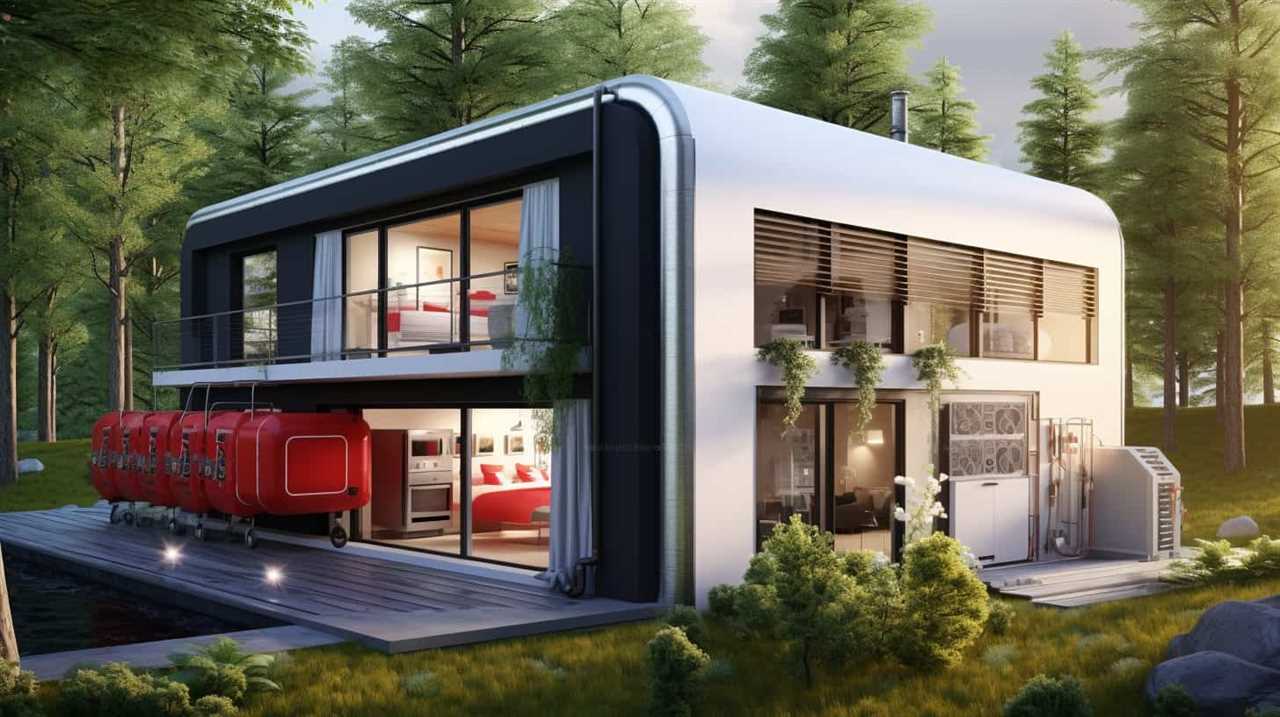
| Heat Pump Model | Cooling Output (BTU/h) | Electrical Power Input (Watts) | EER |
|---|---|---|---|
| Model A | 12,000 | 1,200 | 10 |
| Model B | 14,000 | 1,400 | 10 |
| Model C | 18,000 | 1,800 | 10 |
| Model D | 24,000 | 2,400 | 10 |
In this table, we can see that all four heat pump models have an EER of 10. This means that for every watt of electrical power input, the heat pump is able to produce 10 BTU/h of cooling output. Evaluating the EER allows us to compare different heat pump models and choose the one that offers the best balance between cooling performance and energy consumption.
Seasonal Energy Efficiency Ratio (SEER) and Heat Pump Performance
When it comes to evaluating the performance of heat pumps, one key metric to consider is the Seasonal Energy Efficiency Ratio (SEER) rating. The SEER rating is a measure of the cooling efficiency of a heat pump over an entire cooling season.
Several factors can affect the performance of a heat pump, including the size of the unit, the quality of the installation, and the climate conditions.
SEER Rating Explained
By understanding the SEER rating, we can gauge the efficiency of a heat pump and optimize its performance. The SEER rating is an important measure that indicates the cooling efficiency of a heat pump or air conditioner over a typical cooling season.

It’s calculated by dividing the total cooling output of the heat pump by the total electric energy input during the same period. A higher SEER rating signifies a more efficient heat pump, as it indicates that the system can provide more cooling output with less energy consumption. This is beneficial not only for reducing energy costs but also for minimizing environmental impact.
The SEER rating allows consumers to compare the efficiency of different heat pump models and make informed decisions when purchasing a new system.
Factors Affecting Heat Pump Performance
One of the main factors that affect heat pump performance is the Seasonal Energy Efficiency Ratio (SEER) rating, and understanding its significance can help us optimize the efficiency of our system.
The SEER rating measures the cooling efficiency of a heat pump over a typical cooling season. A higher SEER rating indicates a more efficient heat pump that can provide greater energy savings. However, it’s important to note that SEER ratings are based on ideal conditions and may not reflect real-world performance.
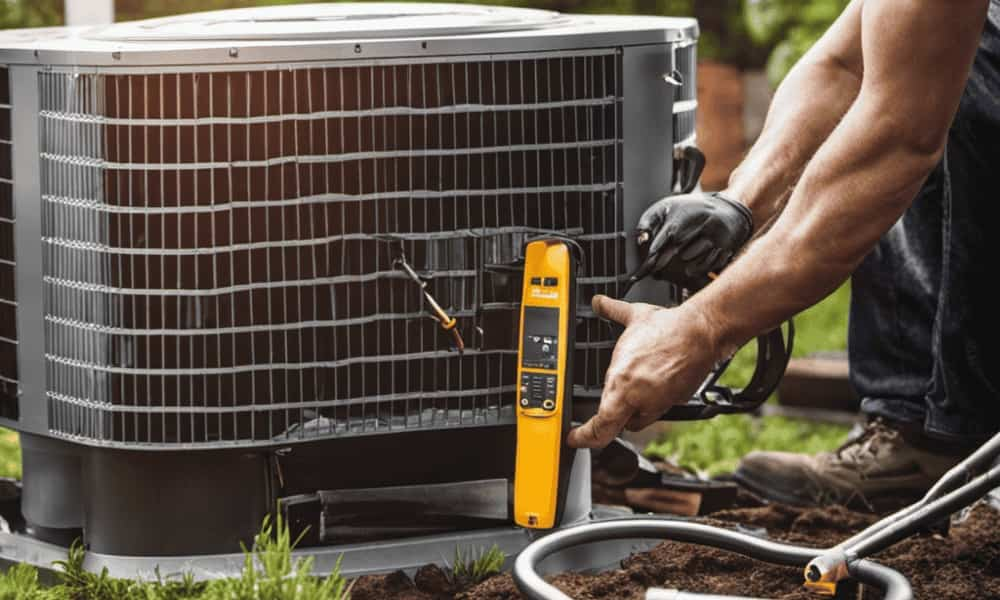
Other factors that can affect heat pump performance include proper heat pump maintenance and optimizing performance through regular filter cleaning, coil cleaning, and lubrication of moving parts.
Improving Heat Pump Efficiency
Understanding the relationship between the Seasonal Energy Efficiency Ratio (SEER) and heat pump performance is crucial for improving the efficiency of our system. By optimizing our heat pump and implementing energy-saving techniques, we can reduce energy consumption and lower our utility bills. Let’s take a look at some strategies for heat pump optimization:
| Heat Pump Optimization | Energy Saving Techniques |
|---|---|
| Regular maintenance | Programmable thermostats |
| Proper insulation | Air sealing |
| Correct sizing | Heat pump zoning |
| Efficient air filters | Geothermal heat pumps |
Regular maintenance ensures that our heat pump is running at its peak efficiency. Proper insulation and air sealing help prevent heat loss, minimizing the workload on the heat pump. Correct sizing ensures that the heat pump is not oversized or undersized for our space. Efficient air filters keep the system clean and improve airflow. Lastly, considering geothermal heat pumps and programmable thermostats can further enhance energy efficiency. By implementing these energy-saving techniques, we can improve our heat pump’s efficiency and decrease our environmental impact.
Improving Heat Pump Efficiency Through Proper Sizing and Installation
Proper sizing and professional installation are crucial factors in improving heat pump efficiency. When a heat pump is correctly sized, it can operate at its optimal capacity and provide maximum heating or cooling output.

Additionally, professional installation ensures that the heat pump is set up correctly, minimizing energy loss and improving overall performance.
Importance of Correct Sizing
We can improve heat pump efficiency by ensuring the correct sizing and installation of the system. Proper sizing is crucial for maximizing the performance and energy efficiency of a heat pump. Here are three reasons why correct sizing is important:
-
Optimal Performance: Correctly sizing a heat pump ensures that it can meet the heating and cooling demands of a space efficiently. Oversized heat pumps may short cycle, leading to frequent on/off cycles and reduced efficiency. Undersized heat pumps, on the other hand, may struggle to maintain desired temperatures, resulting in increased energy consumption.
-
Energy Efficiency: A properly sized heat pump operates at its peak efficiency, consuming less energy to deliver the desired comfort levels. This helps reduce energy bills and lowers the carbon footprint.
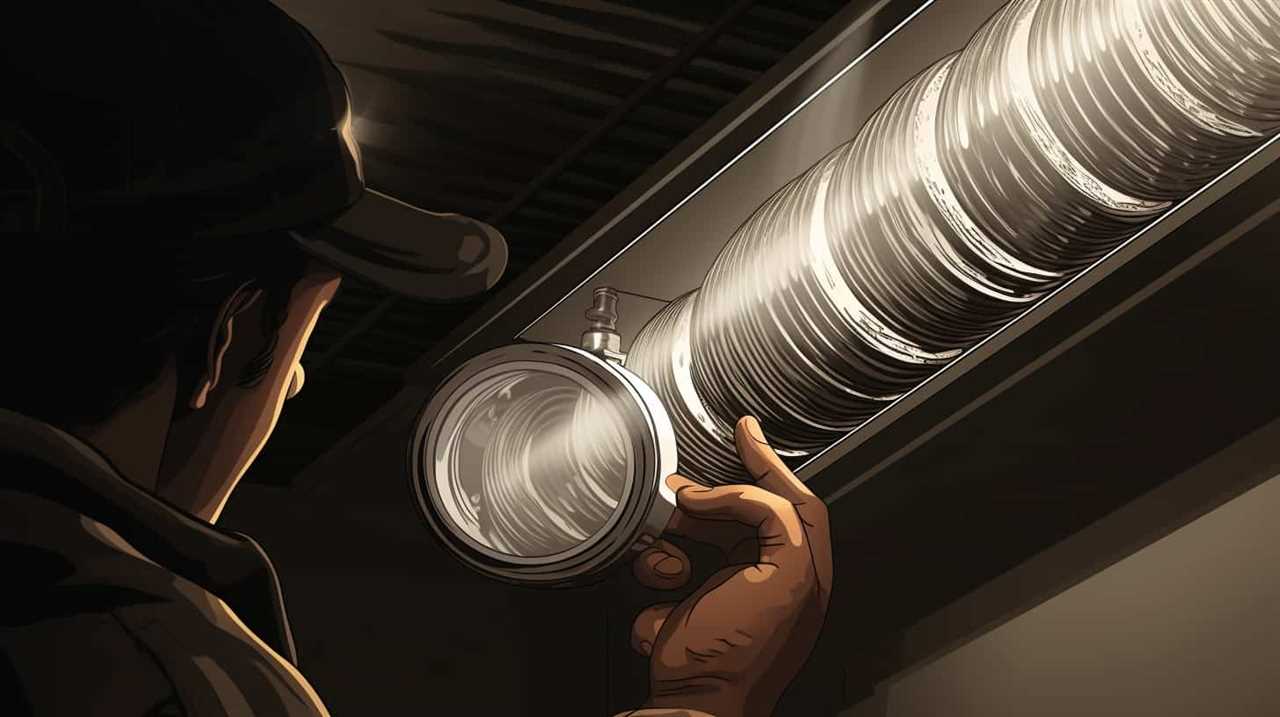
-
Longer Lifespan: Correctly sized heat pumps experience less strain and wear. They’re more likely to have a longer lifespan compared to improperly sized units, which may experience increased wear and tear from excessive cycling and overworking.
Professional Installation Benefits
To ensure optimal heat pump efficiency, it is essential to have a professional installation that includes proper sizing and installation techniques. Hiring a professional with the necessary expertise can greatly improve the performance and longevity of your heat pump system. Professional installers have the knowledge and experience to accurately determine the appropriate size of the heat pump for your specific needs. This is crucial because an undersized or oversized heat pump can result in reduced efficiency and increased energy consumption. Additionally, professional installation ensures that all components are properly connected and calibrated, minimizing the risk of malfunctions and maximizing the system’s overall performance. While the upfront cost of professional installation may be higher, the long-term cost effectiveness of having a properly sized and installed heat pump far outweighs the potential expenses of improper installation and ongoing system inefficiency.
| Professional Installation Benefits |
|---|
| Proper sizing for optimal efficiency |
| Accurate connection and calibration of components |
| Long-term cost effectiveness |
Maximizing Energy Efficiency
Our goal is to maximize energy efficiency by ensuring the proper sizing and installation of heat pumps. By following these three key steps, we can optimize energy consumption and maximize performance:
-
Right-sizing the heat pump: It’s crucial to accurately determine the heating and cooling load requirements of the space. Oversized or undersized heat pumps can lead to inefficiency and reduced performance. A professional assessment can help determine the appropriate size for optimal efficiency.
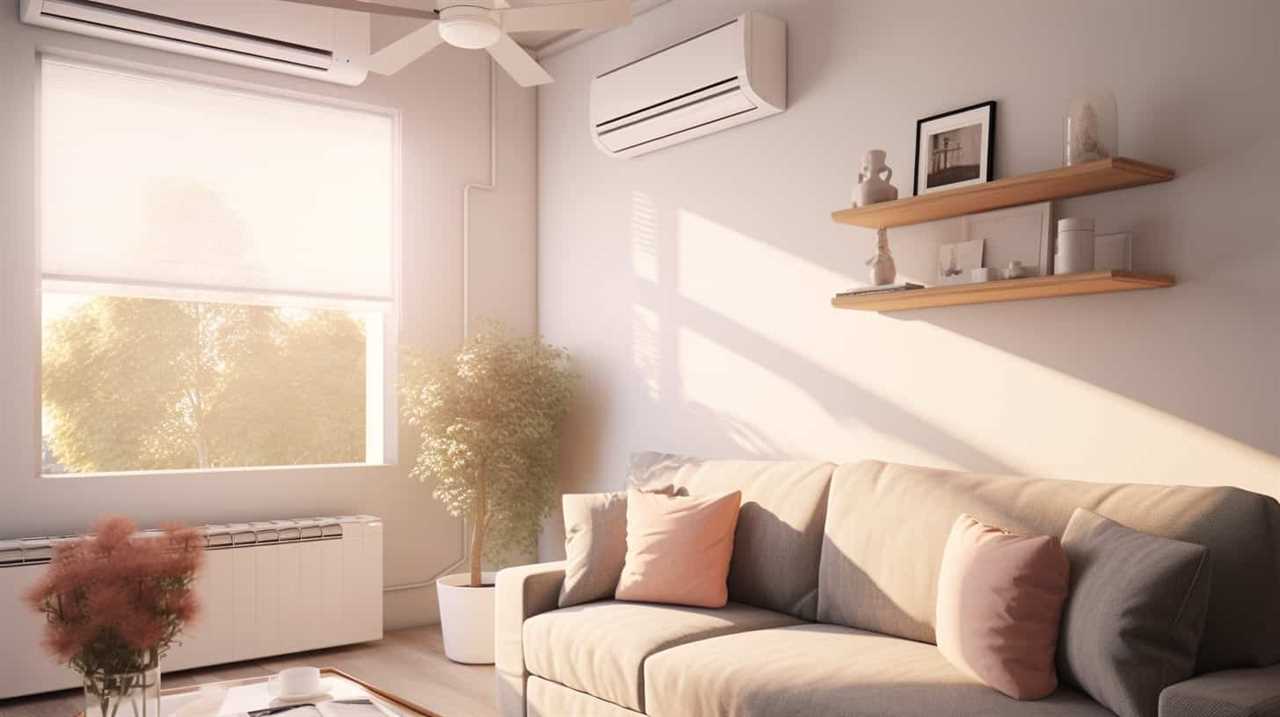
-
Proper installation: Correct installation is essential for the efficient operation of heat pumps. This includes ensuring proper refrigerant charge, adequate airflow, and proper insulation. Professional installation by trained technicians is recommended to avoid potential issues and ensure peak efficiency.
-
Regular maintenance: Regular maintenance is vital to keep heat pumps operating at their best. Cleaning or replacing air filters, checking refrigerant levels, and inspecting the system for any potential issues can help maximize energy efficiency and extend the lifespan of the heat pump.
Enhancing Heat Pump Efficiency With Regular Maintenance and Upgrades
Regular maintenance and upgrades can significantly improve the efficiency of heat pumps. By performing regular maintenance, such as cleaning or replacing air filters, lubricating motors and bearings, and checking refrigerant levels, heat pumps can operate at their optimal efficiency. Regular maintenance benefits include improved energy efficiency, extended lifespan, and reduced repair costs.
Additionally, energy-saving upgrades, such as programmable thermostats, variable-speed motors, and high-efficiency compressors, can further enhance the efficiency of heat pumps. These upgrades allow for better control over temperature settings and reduce energy consumption. According to studies, proper maintenance and energy-saving upgrades can improve heat pump efficiency by up to 25%.

Regular maintenance and upgrades not only save energy and money but also contribute to environmental sustainability by reducing carbon emissions.
Frequently Asked Questions
Can Heat Pumps Be Used for Both Heating and Cooling Purposes?
Yes, heat pumps can be used for both heating and cooling purposes. They have versatile applications and offer numerous advantages, such as energy efficiency and cost savings, making them an ideal choice for climate control.
Are Heat Pumps More Energy-Efficient Compared to Traditional Heating and Cooling Systems?
Heat pumps are more energy-efficient than traditional systems. They can provide up to 300% more heating or cooling energy compared to the electricity they consume. This translates to lower energy bills and reduced carbon emissions.
How Do External Factors, Such as Climate and Temperature, Affect the Efficiency of Heat Pumps?
External factors, such as climate and temperature, have a significant impact on the efficiency of heat pumps. The effect of insulation and the importance of regular maintenance play crucial roles in optimizing their performance.
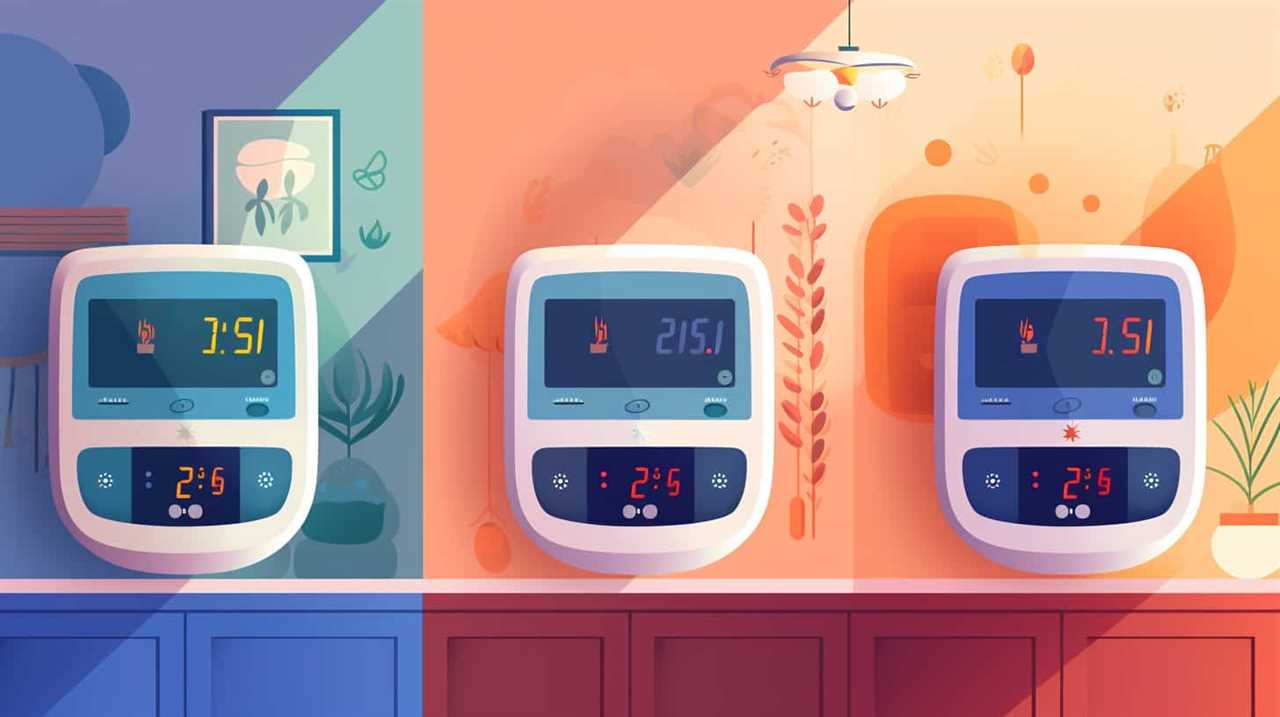
What Is the Difference Between Energy Efficiency Ratio (Eer) and Seasonal Energy Efficiency Ratio (Seer) When Evaluating the Efficiency of Heat Pumps?
When evaluating heat pump efficiency, understanding the differences and significance between the energy efficiency ratio (EER) and seasonal energy efficiency ratio (SEER) is crucial. How do these ratios determine performance?
What Are Some Common Maintenance Practices or Upgrades That Can Enhance the Efficiency of Heat Pumps?
To enhance the efficiency of heat pumps, we recommend regular maintenance practices and upgrades. This includes DIY maintenance like filter cleaning, optimizing airflow, and adjusting thermostat settings. Additionally, professional servicing, proper insulation, ductwork inspection, and refrigerant charge checks can all contribute to energy savings.
Conclusion
In conclusion, heat pumps play a vital role in climate control by efficiently transferring heat from one area to another. By understanding and evaluating factors such as the Energy Efficiency Ratio (EER) and Seasonal Energy Efficiency Ratio (SEER), we can determine the performance and efficiency of heat pumps.
Proper sizing, installation, and regular maintenance can further enhance their efficiency. By continually improving heat pump technology, we can create a more sustainable and energy-efficient future.

-

 Residential and Commercial Applications2 days ago
Residential and Commercial Applications2 days agoBest Amana Heat Pump Reviews
-

 Thermal Energy Transfer4 days ago
Thermal Energy Transfer4 days agoBreakthroughs in Modern Heat Pump Systems: Thermal Energy Edition
-

 Residential and Commercial Applications1 day ago
Residential and Commercial Applications1 day agoBest Heat Pump
-

 Geothermal Heat Pumps3 months ago
Geothermal Heat Pumps3 months agoUpgrade Your Comfort with Our Efficient HVAC Systems
-

 Air Conditioning2 months ago
Air Conditioning2 months agoExploring Energy-Efficient Air Conditioning Heat Pumps
-

 Geothermal Heat Pumps3 months ago
Geothermal Heat Pumps3 months agoInnovative Geothermal Heat Pump Manufacturers Revolutionize Energy Efficiency
-

 Thermal Energy Transfer4 weeks ago
Thermal Energy Transfer4 weeks agoBoost Your Heat Pump Efficiency: Interactive Guide
-

 Residential and Commercial Applications1 day ago
Residential and Commercial Applications1 day agoBest Portable Heat Pump Heat & AC










